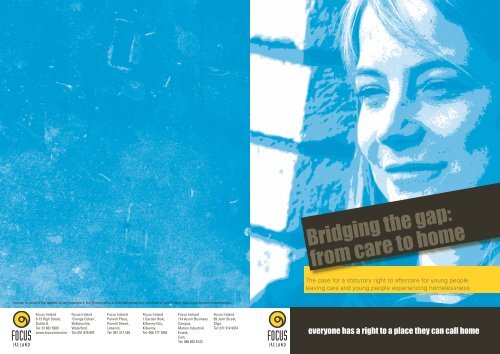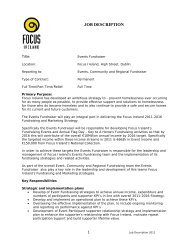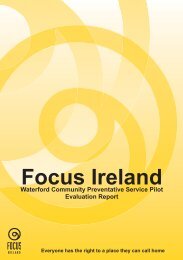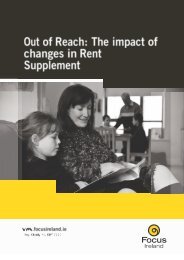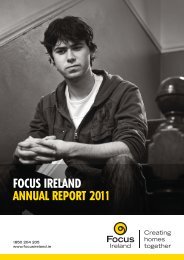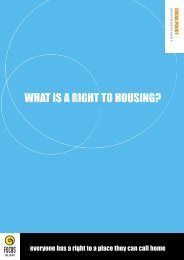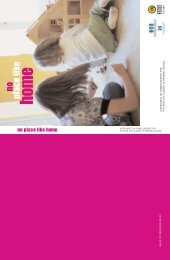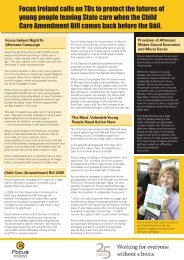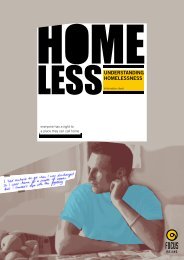Bridging the gap: from care to home - Focus Ireland
Bridging the gap: from care to home - Focus Ireland
Bridging the gap: from care to home - Focus Ireland
Create successful ePaper yourself
Turn your PDF publications into a flip-book with our unique Google optimized e-Paper software.
<strong>Bridging</strong> <strong>the</strong> <strong>gap</strong>:<br />
<strong>from</strong> <strong>care</strong> <strong>to</strong> <strong>home</strong><br />
The case for a statu<strong>to</strong>ry right <strong>to</strong> after<strong>care</strong> for young people<br />
leaving <strong>care</strong> and young people experiencing <strong>home</strong>lessness<br />
In order <strong>to</strong> protect <strong>the</strong> identity of our cus<strong>to</strong>mers, <strong>the</strong> pho<strong>to</strong>graphs in this publication are not those of people who have experienced <strong>home</strong>lessness<br />
<strong>Focus</strong> <strong>Ireland</strong><br />
9-12 High Street,<br />
Dublin 8.<br />
Tel: 01 881 5900<br />
www.focusireland.ie<br />
<strong>Focus</strong> <strong>Ireland</strong><br />
‘Grange Cohan’,<br />
Ballytruckle,<br />
Waterford.<br />
Tel: 051 879 807<br />
<strong>Focus</strong> <strong>Ireland</strong><br />
Parnell Place,<br />
Parnell Street,<br />
Limerick.<br />
Tel: 061 317 199<br />
<strong>Focus</strong> <strong>Ireland</strong><br />
1 Garden Row,<br />
Kilkenny City,<br />
Kilkenny.<br />
Tel: 056 777 7848<br />
<strong>Focus</strong> <strong>Ireland</strong><br />
114 Acorn Business<br />
Campus,<br />
Mahon Industrial<br />
Estate,<br />
Cork.<br />
Tel: 086 602 8143<br />
<strong>Focus</strong> <strong>Ireland</strong><br />
69 John Street,<br />
Sligo.<br />
Tel: 071 914 9974<br />
everyone has a right <strong>to</strong> a place <strong>the</strong>y can call <strong>home</strong>
<strong>Bridging</strong> <strong>the</strong> <strong>gap</strong>:<br />
<strong>from</strong> <strong>care</strong> <strong>to</strong> <strong>home</strong><br />
Welcome <strong>to</strong> this publication which aims <strong>to</strong> advance <strong>Focus</strong> <strong>Ireland</strong>’s<br />
campaign calling for a statu<strong>to</strong>ry right <strong>to</strong> after<strong>care</strong> for young people leaving<br />
<strong>care</strong> and young people experiencing <strong>home</strong>lessness in <strong>Ireland</strong>. We<br />
believe this statu<strong>to</strong>ry right is essential <strong>to</strong> protect <strong>the</strong> futures of young<br />
people in <strong>care</strong> and help <strong>the</strong>m make a successful transition <strong>to</strong> adult life.<br />
Of <strong>the</strong> 5,000 plus children and young people in <strong>care</strong> <strong>to</strong>day 80% are in<br />
foster <strong>care</strong> and <strong>the</strong> remainder live in children’s residential centres. In<br />
2006 <strong>the</strong>re were nearly 500 <strong>home</strong>less youth not being <strong>care</strong>d for by any<br />
family member. The current situation is that once a young person turns<br />
18 years of age <strong>the</strong> State no longer has a legal obligation <strong>to</strong> provide<br />
after<strong>care</strong> support and housing. This is <strong>the</strong> very reason why <strong>Focus</strong><br />
<strong>Ireland</strong> is calling for a statu<strong>to</strong>ry right <strong>to</strong> after<strong>care</strong> – <strong>to</strong> ensure young<br />
people leaving <strong>care</strong> are protected during what can be a vulnerable time.<br />
Not every young person leaving <strong>care</strong> needs support but it is vital <strong>to</strong><br />
provide it for those who do. Many of <strong>the</strong> young people recognise that<br />
<strong>the</strong>y need support <strong>to</strong> bridge <strong>the</strong> <strong>gap</strong> <strong>from</strong> <strong>care</strong> <strong>to</strong> independent living.<br />
Young people deemed <strong>home</strong>less under section 5 of <strong>the</strong> Child<strong>care</strong> Act<br />
1991 may be more vulnerable <strong>the</strong>n children in residential or foster <strong>care</strong><br />
and are also entitled <strong>to</strong> <strong>the</strong> security of after<strong>care</strong> support on becoming<br />
18 years of age.<br />
A pilot study by <strong>the</strong> HSE in Dublin in 2005 showed that nearly one third<br />
of a sample of young people in <strong>care</strong> would prefer supported<br />
accommodation when <strong>the</strong>y left <strong>the</strong> system at 18 years of age. It<br />
was also noted by <strong>the</strong> HSE at that time that if this level of need was<br />
replicated around <strong>the</strong> country <strong>the</strong> demand for supported accommodation<br />
would far outweigh supply. Meanwhile, <strong>the</strong> Government’s Youth<br />
Homelessness Strategy also recognises <strong>the</strong> need for after<strong>care</strong> as it<br />
states that, “After<strong>care</strong> is an integral part of <strong>the</strong> <strong>care</strong> process, it is not an<br />
optional extra.” <strong>Focus</strong> <strong>Ireland</strong> is working hard with <strong>the</strong> Government, <strong>the</strong><br />
HSE and o<strong>the</strong>r relevant bodies <strong>to</strong> provide support services and<br />
accommodation for young people leaving <strong>care</strong>. Much good work has<br />
been done through working in partnership in this area, including <strong>the</strong> recent<br />
opening in Dublin of <strong>Focus</strong> <strong>Ireland</strong>’s Chéad Chéim after<strong>care</strong> project<br />
and <strong>the</strong> opening of <strong>the</strong> South Dublin After<strong>care</strong> Support and Settlement<br />
Service both of which feature in this magazine. We are also working<br />
with <strong>the</strong> HSE through <strong>the</strong> Crisis Intervention Services Partnership responding<br />
<strong>to</strong> young people at risk of <strong>home</strong>lessness and facilitating <strong>the</strong>ir<br />
return <strong>to</strong> <strong>the</strong>ir family or a residential <strong>care</strong> placement.<br />
Not everyone who needs this support is receiving it as of yet, and our<br />
experience has borne this out as <strong>the</strong>re is already a waiting list for our<br />
after<strong>care</strong> project in Dublin. As I have said, <strong>Focus</strong> <strong>Ireland</strong> believes <strong>the</strong><br />
right <strong>to</strong> after<strong>care</strong> now needs <strong>to</strong> be placed firmly as a legal obligation of<br />
<strong>the</strong> State and we are working <strong>to</strong> advance this. The first stage in any<br />
campaign is <strong>to</strong> demonstrate why change is necessary and <strong>to</strong> show<br />
Contents<br />
Paul McGrath’s s<strong>to</strong>ry 01<br />
Young people leaving <strong>care</strong> - Sr Stanilaus Kennedy, <strong>Focus</strong> <strong>Ireland</strong> 02<br />
HSE model for <strong>the</strong> delivery of after<strong>care</strong> services - 06<br />
Sheila Marshall and Mark Yalloway, HSE<br />
Vulnerable children: <strong>the</strong> case for reform - 09<br />
Geoffrey Shannon, Solici<strong>to</strong>r and Special Rapporteur<br />
on Child Protection<br />
<strong>Focus</strong> On: Chéad Chéim - Karen Doyle, <strong>Focus</strong> <strong>Ireland</strong> 12<br />
what needs <strong>to</strong> be done. I hope this<br />
magazine will bring added focus and<br />
understanding <strong>to</strong> this matter. As we<br />
all know any campaign for change<br />
has <strong>to</strong> generate support <strong>to</strong> be<br />
successful.<br />
To this end I would like <strong>to</strong> pay<br />
special tribute <strong>to</strong> <strong>the</strong> invaluable<br />
support and input <strong>from</strong> people including Paul McGrath; Children’s<br />
Ombudsman Emily Logan; Geoffrey Shannon; Sheila Marshall; Mark<br />
Yalloway; our own experienced staff; <strong>Focus</strong> <strong>Ireland</strong>’s Life President Sr.<br />
Stanislaus Kennedy; and <strong>the</strong> young people <strong>the</strong>mselves, as represented<br />
by <strong>the</strong> <strong>the</strong> Irish Association of Young People in Care. Paul tells movingly<br />
in this magazine of his own experiences upon leaving <strong>care</strong> and how<br />
support at this crucial time could have really helped him. One of <strong>the</strong><br />
young people we work with also speaks candidly of her own<br />
experiences and how our services have helped her make <strong>the</strong> transition<br />
<strong>from</strong> <strong>care</strong> <strong>to</strong> independent living.<br />
<strong>Focus</strong> <strong>Ireland</strong> has a strong track record of working <strong>to</strong> advance change<br />
since Sr. Stanislaus founded our <strong>home</strong>less and housing charity in 1985.<br />
This work is informed through our research and experience of working<br />
directly with people who are marginalised in society. <strong>Focus</strong> <strong>Ireland</strong><br />
will be actively continuing our campaign calling for a statu<strong>to</strong>ry right <strong>to</strong><br />
after<strong>care</strong> through <strong>the</strong> political system by future lobbying. We will also<br />
work <strong>to</strong> raise public awareness and support for this campaign through<br />
our communications work.<br />
We will also continue our partnership work <strong>to</strong> directly provide <strong>the</strong><br />
services and accommodation needed <strong>to</strong> ensure that support is provided<br />
for young people leaving <strong>care</strong>. Our campaign is geared <strong>to</strong>wards<br />
ensuring that one day soon <strong>the</strong>se services will be a legal right for those<br />
who need <strong>the</strong>m. I hope you find this magazine informative and that<br />
it will act <strong>to</strong> prompt you <strong>to</strong> support our campaign in any way you can.<br />
Working <strong>to</strong>ge<strong>the</strong>r we can each play our part <strong>to</strong> help protect <strong>the</strong> futures<br />
of vulnerable young people leaving <strong>care</strong> all around <strong>Ireland</strong>.<br />
Yours sincerely,<br />
Joyce Loughnan,<br />
Chief Executive, <strong>Focus</strong> <strong>Ireland</strong><br />
Preventing youth <strong>home</strong>lessness - Orla Barry, <strong>Focus</strong> <strong>Ireland</strong> 15<br />
<strong>Focus</strong> On: South Dublin After<strong>care</strong> Support and 17<br />
Settlement Service - Michelle Carroll, <strong>Focus</strong> <strong>Ireland</strong><br />
After<strong>care</strong> in <strong>the</strong> context of <strong>the</strong> rights of a child - 19<br />
Emily Logan, Ombudsman for Children’s Office<br />
After<strong>care</strong> for Over 18s - Neil Forsyth, <strong>Focus</strong> <strong>Ireland</strong> 20<br />
Supporting <strong>the</strong> right <strong>to</strong> after<strong>care</strong> - 23<br />
Irish Association of Young People in Care<br />
<strong>Focus</strong> <strong>Ireland</strong>’s services for young people - 24<br />
Ca<strong>the</strong>rine Maher, <strong>Focus</strong> <strong>Ireland</strong><br />
‘‘Becoming <strong>home</strong>less has a very<br />
serious impact on young people.’’<br />
The HSE in Dublin Mid-Leinster agreed <strong>to</strong> work in partnership<br />
with <strong>Focus</strong> <strong>Ireland</strong> <strong>to</strong> provide a range of after<strong>care</strong> services in<br />
<strong>the</strong> greater south Dublin area. The first stage of our<br />
collaboration was <strong>the</strong> establishment of our South Dublin<br />
After<strong>care</strong> Support and Settlement Service in April 2007.<br />
The second stage of this collaboration will be setting up a<br />
residential after<strong>care</strong> facility in <strong>the</strong> south Dublin area in 2008.<br />
<strong>Focus</strong> <strong>Ireland</strong> provides after<strong>care</strong> support on behalf of <strong>the</strong><br />
HSE in Waterford and plans <strong>to</strong> open residential after<strong>care</strong> in<br />
<strong>the</strong> city in 2009.<br />
Prison-in-Reach is run in partnership with <strong>the</strong> Probation<br />
Service and <strong>the</strong> Irish Prison Service and aims <strong>to</strong> provide<br />
a case management approach geared <strong>to</strong>wards preventing<br />
people becoming or returning <strong>to</strong> <strong>home</strong>lessness on leaving<br />
prison. Our research has shown that <strong>the</strong>re is a complex<br />
relationship between release <strong>from</strong> prison and entering a<br />
cycle of <strong>home</strong>lessness, crime and re-offending behaviour.<br />
In recognition of this, prison visits <strong>to</strong> maintain contact with<br />
young people and ensure a service link on <strong>the</strong>ir release has<br />
been an element of <strong>Focus</strong> <strong>Ireland</strong>’s youth service for many<br />
years.<br />
Off-<strong>the</strong>-Streets provides a short-term residential programme<br />
for young people aged between 16 and 18 years of age as<br />
part of <strong>the</strong> HSE Crisis Intervention Services. Staff endeavour<br />
<strong>to</strong> provide a welcoming, safe and supportive environment for<br />
young people who are out-of-<strong>home</strong> or at risk of becoming<br />
<strong>home</strong>less. Our staff support young people throughout <strong>the</strong>ir<br />
placement and help <strong>to</strong> engage <strong>the</strong>m with a range of external<br />
professionals. Each young person avails of a structured<br />
programme tailored <strong>to</strong> meet <strong>the</strong>ir specific needs, including<br />
assistance with education, training, employment and<br />
practical living skills. The aim of <strong>the</strong> programme is <strong>to</strong> enable<br />
young people <strong>to</strong> develop a positive self-image and <strong>to</strong> reach<br />
<strong>the</strong>ir full potential through helping <strong>the</strong>m <strong>to</strong> move on and<br />
settle in a permanent <strong>home</strong> of <strong>the</strong>ir own.<br />
The Spokes education programme’s holistic approach <strong>to</strong><br />
education plays a key role in helping people <strong>to</strong> gain valuable<br />
skills and experience <strong>to</strong> support <strong>the</strong>ir progression through<br />
formal and informal education programmes. In order <strong>to</strong> tackle<br />
<strong>home</strong>lessness it is vital <strong>to</strong> provide access <strong>to</strong> education,<br />
training and employment programmes for young<br />
people and adults. These programmes have helped people<br />
gain future employment, build self-esteem and develop<br />
life skills. Many of <strong>the</strong> wide range of training programmes<br />
offered are Fur<strong>the</strong>r Education and Training Awards Council<br />
(FETAC) accredited.<br />
| FOCUS IRELAND | 25
Paul McGrath’s s<strong>to</strong>ry<br />
Paul McGrath is one of <strong>Ireland</strong>’s greatest footballers playing for his country 83 times.<br />
He also played for Dalkey Utd., St. Pats, Man. Utd., As<strong>to</strong>n Villa, Derby and Sheffield<br />
Utd., during his illustrious <strong>care</strong>er.<br />
Paul is supporting <strong>Focus</strong> <strong>Ireland</strong>’s campaign calling for<br />
a statu<strong>to</strong>ry right <strong>to</strong> after<strong>care</strong> for young people leaving<br />
<strong>care</strong>. He writes here about <strong>the</strong> challenges he faced<br />
upon leaving <strong>care</strong> just before his eighteenth birthday.<br />
“The longest walk of my life was <strong>the</strong> one that <strong>to</strong>ok me out<br />
of Dublin’s orphanage system in <strong>the</strong> late 70s. I was petrified.<br />
Having spent eleven years in <strong>the</strong> <strong>care</strong> of Smyly Trust Homes,<br />
I left Racefield for a little flat on Northumberland Avenue that<br />
I remember quite vividly <strong>to</strong> this day. Number 28. Yellow door.<br />
Cold. I was <strong>to</strong>tally unprepared for a life of independence. In<br />
fact, it would take me months <strong>to</strong> come <strong>to</strong> terms with <strong>the</strong><br />
fact that I was now, essentially, in charge of my own <strong>care</strong>. To<br />
me, <strong>the</strong> most important thing coming out of <strong>care</strong> is <strong>to</strong> know<br />
that <strong>the</strong>re is somewhere you can go back <strong>to</strong>. That you’re not<br />
entirely isolated. I wouldn’t say that I felt a loner when I came<br />
out, but I did feel exposed. Looking back, I wasn’t being<br />
pushed out, but that’s pretty much how it felt <strong>to</strong> me at <strong>the</strong><br />
time. I was being released in<strong>to</strong> <strong>the</strong> real world, but I missed<br />
<strong>the</strong> comfort of familiarity. Of routine. Of having been<br />
institutionalised, I suppose.<br />
It’s like being caught in some kind of twilight zone. You know<br />
that you have <strong>to</strong> leave. You know that you have <strong>to</strong> move on.<br />
But part of you is pulling <strong>the</strong> o<strong>the</strong>r way. You want <strong>the</strong><br />
re-assurance of having familiar people <strong>to</strong> talk <strong>to</strong>. People <strong>to</strong><br />
ask questions of and be re-assured by. I mean I left <strong>care</strong> just<br />
before my eighteenth birthday, having spent virtually my<br />
whole life getting my tea made for me. Suddenly, you’re in<br />
a flat, left <strong>to</strong> your own devices. If you don’t make yourself<br />
something, you don’t eat. It’s that simple. For my first six<br />
months out of <strong>the</strong> system, I think I hardly ever ate anything<br />
o<strong>the</strong>r than beans on <strong>to</strong>ast. Someone brought up within a<br />
conventional family unit might find that a little hard <strong>to</strong><br />
understand. But simple things become incredibly<br />
intimidating. Having <strong>to</strong> pay bills, for example. I<br />
remember <strong>the</strong> apartment I moved in<strong>to</strong> was absolutely<br />
freezing for a long spell because I couldn’t quite come <strong>to</strong><br />
terms with having <strong>to</strong> pay a heating bill. Then <strong>the</strong>re was <strong>the</strong><br />
responsibility of making sure <strong>the</strong>re was something <strong>to</strong> eat in<br />
<strong>the</strong> cupboard. Milk in <strong>the</strong> fridge even. It felt a massive step.<br />
To be fair <strong>to</strong> Smylys, <strong>the</strong>y did have a good group of people<br />
that you could go back <strong>to</strong>. But that was ano<strong>the</strong>r of my<br />
problems. I was never a great communica<strong>to</strong>r. I didn’t really<br />
like asking for help. Maybe my biggest failing was obstinacy.<br />
I wanted people <strong>to</strong> think that I was strong and confident.<br />
That I could make it on my own. I was like <strong>the</strong> duck on <strong>the</strong><br />
pond, gliding serenely across <strong>the</strong> surface, but flapping<br />
furiously underneath. Your head is so full of questions at a<br />
time like that. And, looking back, <strong>the</strong> more questions you<br />
ask, <strong>the</strong> better. It’s a <strong>to</strong>ugh time. Awful really. No matter how<br />
gently it’s done, <strong>the</strong> fundamental thing that’s happening is<br />
you are being cut off <strong>from</strong> a life you know. And that’s<br />
incredibly daunting. It’s a lonely time. You feel cut adrift.<br />
You find yourself sitting in a bed-sit. You have a job <strong>to</strong> go <strong>to</strong>.<br />
I remember my gut instinct at <strong>the</strong> time was <strong>to</strong> go back <strong>to</strong><br />
where I had been comfortable. Deep down, you know that<br />
you can’t do that. That this is your life now. But it doesn’t feel<br />
good. I mean <strong>the</strong> shock of going in<strong>to</strong> <strong>care</strong> is one thing. But<br />
<strong>the</strong> shock of coming out is almost as significant. I certainly<br />
found that. I had been in a set routine for eleven years <strong>the</strong>n,<br />
suddenly, I was back out. And now you’re on your own. It’s<br />
like a fear of fear itself. You couldn’t actually pin-point what it<br />
is that frightens you. But it’s <strong>the</strong>re. You now have a<br />
responsibility. You have <strong>to</strong> set <strong>the</strong> alarm for <strong>the</strong> morning so<br />
that you’re up in time for work. You’ve got <strong>to</strong> keep that job,<br />
make sure <strong>the</strong>re’s some cash in your pocket.<br />
I made a load of mistakes. I lost a number of jobs and, being<br />
honest, was just blessed in <strong>the</strong> end that I could play football.<br />
I always felt that my life would resolve itself through football<br />
and that’s pretty much what happened. Some good people at<br />
Dalkey United <strong>to</strong>ok me under <strong>the</strong>ir wing. They kept<br />
getting me new jobs. Because of <strong>the</strong> football, I think <strong>the</strong>y<br />
saw something in me and wanted <strong>to</strong> help. They felt I could<br />
make something of myself. Without that help, I’m not sure<br />
how I’d have coped with life outside what felt <strong>to</strong> me like <strong>the</strong><br />
comfort blanket of <strong>care</strong>. Bot<strong>to</strong>m line, you need people <strong>to</strong> look<br />
out for you. But you need <strong>to</strong> be prepared <strong>to</strong> ask questions<br />
<strong>to</strong>o.”<br />
| FOCUS IRELAND | 1
Young people leaving <strong>care</strong><br />
Sr. Stanislaus Kennedy, Life President, <strong>Focus</strong> <strong>Ireland</strong>.<br />
Young people leaving <strong>care</strong> have always had a hard road<br />
<strong>to</strong> travel as <strong>the</strong>y struggle <strong>to</strong> make <strong>the</strong> transition <strong>from</strong><br />
<strong>care</strong> <strong>to</strong> finding <strong>the</strong>mselves out on <strong>the</strong>ir own in <strong>the</strong><br />
world. This is not uncommon and many of <strong>the</strong> people<br />
<strong>Focus</strong> <strong>Ireland</strong> has worked with over <strong>the</strong> years come<br />
<strong>from</strong> a background of leaving State <strong>care</strong>. Since <strong>Focus</strong><br />
<strong>Ireland</strong> was founded in <strong>the</strong> mid 80’s people leaving<br />
<strong>care</strong> formed a core part of cus<strong>to</strong>mers who availed of<br />
our services for people who are <strong>home</strong>less or at risk of<br />
becoming <strong>home</strong>less. From this experience we have<br />
always been conscious that young people leaving <strong>care</strong><br />
are at a vulnerable stage and at great risk of falling prey<br />
<strong>to</strong> problems including <strong>home</strong>lessness.<br />
One of <strong>the</strong> critical reasons for <strong>the</strong>se difficulties is that young<br />
people have <strong>to</strong> make <strong>the</strong> transition <strong>from</strong> residential <strong>care</strong> <strong>to</strong><br />
independence very quickly unlike those growing up within<br />
family <strong>home</strong>s who usually get <strong>the</strong> time and support needed<br />
<strong>to</strong> make <strong>the</strong> transition <strong>to</strong> independence. When young people<br />
leave school <strong>the</strong>y often move on <strong>to</strong> college or work and<br />
eventually leave <strong>the</strong> family <strong>home</strong>. It is part of people’s<br />
experiences in life that <strong>the</strong>y move on <strong>to</strong> set up a <strong>home</strong> of<br />
<strong>the</strong>ir own and we all have some degree of anxiety at this<br />
time as it is a big step.<br />
However, for young people leaving <strong>care</strong> this is a much more<br />
daunting step. It is generally not a gradual process but<br />
happens suddenly when <strong>the</strong> young person becomes 18 years<br />
of age as that is <strong>the</strong> age when <strong>the</strong> State no longer has a legal<br />
requirement <strong>to</strong> provide <strong>care</strong>. It is at this young age <strong>the</strong>y have<br />
<strong>to</strong> find <strong>the</strong>ir independence without <strong>the</strong> kind of support, love<br />
and advice provided by parents, family and friends that <strong>the</strong>ir<br />
peers would have. Their peers are usually given <strong>the</strong> time and<br />
space <strong>to</strong> negotiate this complex transition at <strong>the</strong>ir own pace.<br />
Many a young person might leave <strong>home</strong> for a while when<br />
<strong>the</strong>y are in <strong>the</strong>ir late teens or early 20s only <strong>to</strong> return <strong>to</strong> <strong>the</strong><br />
family nest at some stage if things go wrong in some way.<br />
They have this safety net and along with <strong>the</strong> space and<br />
support <strong>to</strong> regroup at <strong>home</strong> before venturing off again<br />
independently in<strong>to</strong> <strong>the</strong> world at some later point.<br />
For most people, even though it is an anxious time, it is a<br />
very natural part of growing up. In contrast, young people<br />
leaving <strong>care</strong> and taking <strong>the</strong>ir first tentative steps in<strong>to</strong><br />
independence are very much on <strong>the</strong>ir own. It is not a natural<br />
right of passage but a forced transition at 18 years of age<br />
<strong>from</strong> a highly structured institutional setting <strong>to</strong> an<br />
unsupported, unstructured life style. Most young people<br />
leaving <strong>care</strong> don’t get a second chance. If <strong>the</strong>ir job or<br />
housing doesn’t work out, <strong>the</strong>y cannot go back <strong>to</strong> <strong>care</strong><br />
because <strong>the</strong>y are now eighteen years of age or older and<br />
have <strong>to</strong> fend for <strong>the</strong>mselves. So what happens <strong>to</strong> people in<br />
this situation?<br />
It is our experience that young people in this situation feel<br />
<strong>to</strong>tally lost, isolated and do not know where <strong>to</strong> turn for<br />
support. Negotiating <strong>the</strong> social welfare system or housing<br />
2 | FOCUS IRELAND |<br />
“68% of those who <strong>to</strong>ok<br />
<strong>home</strong>lessness within two years
system is difficult <strong>to</strong> navigate for anyone at <strong>the</strong> best of times.<br />
This is especially true for young people leaving <strong>care</strong> who<br />
have not had <strong>the</strong> support while growing up <strong>to</strong> learn many<br />
things that help people <strong>to</strong> cope with difficult situations. Most<br />
of us pick up <strong>the</strong>se coping mechanisms without even<br />
realising it - almost like a process of osmosis - <strong>from</strong> growing<br />
up in a family <strong>home</strong>.<br />
Without this preparation for independent life young people<br />
find it hard <strong>to</strong> cope when things go wrong. This situation is<br />
made worse as <strong>the</strong>re is a lack of suitable accommodation<br />
and support <strong>to</strong> meet <strong>the</strong> needs of young people at <strong>the</strong><br />
different stages of leaving <strong>care</strong>. Consequently, people can<br />
very quickly fall on hard times and fall in<strong>to</strong> <strong>home</strong>lessness.<br />
But this can be avoided if young people get <strong>the</strong> support <strong>the</strong>y<br />
need. Since <strong>the</strong> 1980’s <strong>Focus</strong> <strong>Ireland</strong> has campaigned for<br />
better policies and services for young people leaving <strong>care</strong>.<br />
Ten years ago, <strong>Focus</strong> <strong>Ireland</strong> carried out a major study on<br />
young people leaving <strong>care</strong>. This study, “Left Out on <strong>the</strong>ir<br />
Own: Young People Leaving Care in <strong>Ireland</strong>.’’ was published<br />
in <strong>the</strong> year 2000. It was a seminal piece of research and it<br />
remains <strong>the</strong> most comprehensive study carried out in this<br />
area. This study found that young people leaving <strong>care</strong> were<br />
not receiving <strong>the</strong> required levels of support <strong>the</strong>y needed<br />
<strong>to</strong> prepare <strong>the</strong>m <strong>to</strong> leave <strong>care</strong> and that <strong>the</strong>y were without<br />
proper after<strong>care</strong> services. It discovered that as many as 68%<br />
of those who <strong>to</strong>ok part in <strong>the</strong> study had experienced <strong>home</strong>lessness<br />
within two years of leaving <strong>the</strong> <strong>care</strong> of <strong>the</strong> state.<br />
part in <strong>the</strong> study had experienced<br />
of leaving <strong>the</strong> <strong>care</strong> of <strong>the</strong> state.“<br />
| FOCUS IRELAND | 3
Since 2002 we have seen progress in <strong>the</strong> provision of<br />
services for young people leaving <strong>care</strong>. The Youth<br />
Homelessness Strategy launched in 2001 was a major step<br />
forward. It outlines Government policy and highlights <strong>the</strong><br />
risks of <strong>home</strong>lessness and social exclusion for young people<br />
leaving <strong>care</strong>. It also places an obligation on each Health<br />
Board <strong>to</strong> produce an after<strong>care</strong> policy and provide resources<br />
for its implementation. Preparation for leaving <strong>care</strong> and<br />
after<strong>care</strong> was no longer <strong>to</strong> be an optional extra but was <strong>to</strong> be<br />
treated as an integral component of <strong>the</strong> <strong>care</strong> process.<br />
In implementing that strategy, <strong>the</strong> HSE has worked very<br />
closely with voluntary agencies such as <strong>Focus</strong> <strong>Ireland</strong> and<br />
<strong>the</strong> development and <strong>the</strong> opening of <strong>Focus</strong> <strong>Ireland</strong>’s after<strong>care</strong><br />
accommodation project in Dublin city centre - described<br />
elsewhere in this magazine - is one example of this<br />
co-operation. The project provides 10 apartments for young<br />
people aged 18-21 where <strong>the</strong>y live in a supported<br />
environment for a year after leaving <strong>care</strong>, after which <strong>the</strong>y are<br />
given support for up <strong>to</strong> two years in settling in<strong>to</strong> a house of<br />
<strong>the</strong>ir own.<br />
However, while <strong>the</strong>re has been significant progress made in<br />
terms of Government policy, professional practice and<br />
improved <strong>care</strong> provision, <strong>the</strong>re are still considerable <strong>gap</strong>s in<br />
<strong>the</strong> service and not all policies have been fully put in<strong>to</strong><br />
practise. Young people leaving <strong>care</strong> need a lot of support<br />
and a lot of help. That support and help needs <strong>to</strong> start <strong>the</strong><br />
day <strong>the</strong>y go in<strong>to</strong> <strong>care</strong>.<br />
“There is a lack of suitable<br />
meet <strong>the</strong> needs of young people at<br />
Consequently, people can<br />
fall in<strong>to</strong> <strong>home</strong>lessness.”<br />
4 | FOCUS IRELAND |
Leaving <strong>care</strong> services should be part of a continuum of <strong>care</strong><br />
- In Care, Leaving Care and After<strong>care</strong>. When a person goes<br />
in<strong>to</strong> <strong>care</strong> <strong>the</strong>ir plan for after<strong>care</strong> should begin. After<strong>care</strong><br />
should be an intrinsic part of <strong>care</strong> and should be seen as <strong>the</strong><br />
right of all young people in <strong>the</strong> <strong>care</strong> of <strong>the</strong> state. That is why<br />
<strong>Focus</strong> <strong>Ireland</strong> will continue <strong>to</strong> campaign and lobby for a<br />
statu<strong>to</strong>ry right <strong>to</strong> after<strong>care</strong>.<br />
<strong>Focus</strong> <strong>Ireland</strong> is calling for a statu<strong>to</strong>ry right <strong>to</strong> after<strong>care</strong> <strong>to</strong><br />
ensure young people leaving <strong>care</strong> are protected during what<br />
can be a very vulnerable time. We are advocating for this<br />
measure based on our substantial experience as a service<br />
provider and also based on <strong>the</strong> empirical evidence garnered<br />
through <strong>Focus</strong> <strong>Ireland</strong>’s research on young people leaving<br />
<strong>care</strong>. The transition <strong>from</strong> youth <strong>to</strong> adulthood is a complex and<br />
challenging time for all people and this can especially be <strong>the</strong><br />
case for people in <strong>care</strong>.<br />
This is why I believe it is critical that young people who have<br />
been in <strong>the</strong> <strong>care</strong> of <strong>the</strong> State are supported during this time<br />
and <strong>the</strong>ir rights are fully vindicated. To achieve this <strong>the</strong> right<br />
<strong>to</strong> high quality after<strong>care</strong> needs <strong>to</strong> be placed on a legislative<br />
basis. I fur<strong>the</strong>r believe <strong>the</strong> State has a moral duty <strong>to</strong> provide<br />
such <strong>care</strong> as a right in order <strong>to</strong> protect vulnerable young<br />
people and help <strong>the</strong>m <strong>to</strong> move on <strong>to</strong> have happy and<br />
independent lives. At <strong>the</strong> end of <strong>the</strong> day, this will prove <strong>to</strong> be<br />
a sound investment in <strong>the</strong> parents of our future generations.<br />
accommodation and support <strong>to</strong><br />
<strong>the</strong> different stages of leaving <strong>care</strong>.<br />
very quickly fall on hard times and<br />
| FOCUS IRELAND | 5
HSE model for <strong>the</strong> delivery<br />
of after<strong>care</strong> services<br />
Sheila Marshall and Mark Yalloway, Children and Family Services, HSE Dublin North East.<br />
The issue of adequate preparation for children leaving<br />
<strong>care</strong> has been highlighted for some time. Evidence has<br />
shown that young people need information and<br />
support in advance of independent living. Networking<br />
and building of support systems is required <strong>to</strong><br />
co-ordinate this transition as smoothly as possible.<br />
The development of after<strong>care</strong> policy has been driven by<br />
legislative, regula<strong>to</strong>ry and policy frameworks. The legislative<br />
framework for developing leaving and after<strong>care</strong> services is<br />
primarily driven by <strong>the</strong> Child Care Act, 1991. Relevant<br />
regula<strong>to</strong>ry documents include <strong>the</strong> Child<strong>care</strong> ( Placement of<br />
Children in Foster Care) Regulations 1995 and Child Care<br />
( Placement of Children in Residential Care) Regulations<br />
1995. Policy in this area has been directed by <strong>the</strong> National<br />
Youth Homelessness Strategy, which was launched as<br />
Government policy in Oc<strong>to</strong>ber 2001, and requires each<br />
former health board area <strong>to</strong> produce an after<strong>care</strong> policy with<br />
<strong>the</strong> intention of streng<strong>the</strong>ning <strong>the</strong> position of <strong>the</strong> young<br />
person leaving <strong>care</strong>, supporting <strong>the</strong>ir transition <strong>to</strong><br />
independent living and reducing <strong>the</strong> possibility of<br />
<strong>home</strong>lessness and social exclusion on leaving <strong>care</strong>.<br />
The Model for <strong>the</strong> Delivery of Leaving Care and After<strong>care</strong><br />
Services in HSE North West Dublin, North Central Dublin and<br />
North Dublin was launched on 22nd November 2006. The<br />
Regional Policy on Leaving Care, which was adopted as<br />
policy by <strong>the</strong> Eastern Regional Health Authority in May, 2004,<br />
is <strong>the</strong> key source of direction for <strong>the</strong> development of this<br />
model of <strong>care</strong>. At its core is <strong>the</strong> recognition that <strong>the</strong><br />
development and co-ordination of leaving <strong>care</strong> and after<strong>care</strong><br />
services is a core component in <strong>the</strong> prevention of youth<br />
<strong>home</strong>lessness and in achieving a successful transition <strong>to</strong><br />
independent living for young people leaving <strong>care</strong>.<br />
The model which incorporates a 14 point action plan, aims <strong>to</strong><br />
achieve <strong>the</strong> delivery of appropriate preparation, leaving and<br />
after<strong>care</strong> services. It is a comprehensive multi-disciplinary,<br />
multi-agency approach, involving <strong>the</strong> areas of health, welfare,<br />
education, training and accommodation, and will be<br />
implemented for young people in <strong>care</strong> between <strong>the</strong> age of 16<br />
and 18 years and young people in after<strong>care</strong>. <strong>Focus</strong> <strong>Ireland</strong> is<br />
one of <strong>the</strong> service providers which have been contracted by<br />
<strong>the</strong> HSE <strong>to</strong> provide an outreach after<strong>care</strong> service and is a key<br />
partner in supporting <strong>the</strong> HSE <strong>to</strong> meet its statu<strong>to</strong>ry<br />
obligations under <strong>the</strong> Child Care Act 1991 and <strong>the</strong> Youth<br />
Homelessness Strategy 2001 in this regard.<br />
The development of <strong>the</strong> model has involved working in<br />
co-operation with different agencies <strong>to</strong> address <strong>the</strong> issues<br />
that affect young people when <strong>the</strong>y leave <strong>care</strong> as follows:<br />
- The development of a needs assessment format and a<br />
preparation for leaving <strong>care</strong>/after<strong>care</strong> plan template;<br />
- Negotiations <strong>to</strong>ok place between representatives of <strong>the</strong><br />
Superintendent Community Welfare Officers and <strong>the</strong> Area<br />
Administra<strong>to</strong>rs <strong>to</strong> develop a template for an after<strong>care</strong><br />
financial support package and access <strong>to</strong> health services;<br />
- Negotiations were undertaken with representatives of<br />
Dublin City Council and Fingal County Council <strong>to</strong> agree<br />
pro<strong>to</strong>cols <strong>to</strong> access local authority housing;<br />
- The voluntary organisations included in <strong>the</strong> provision of<br />
after<strong>care</strong> were requested and under<strong>to</strong>ok <strong>to</strong> increase <strong>the</strong>ir<br />
capacity for residential after<strong>care</strong> programmes, with<br />
particular reference <strong>to</strong> creating capacity for girls. <strong>Focus</strong><br />
<strong>Ireland</strong> has recently opened a newly refurbished premises<br />
in response <strong>to</strong> this need;<br />
6 | FOCUS IRELAND |
“There is an imperative <strong>to</strong> have<br />
a unified, standard approach<br />
throughout <strong>the</strong> HSE <strong>to</strong> <strong>the</strong><br />
delivery of leaving and after<strong>care</strong><br />
services and that this approach<br />
has <strong>the</strong> support of all partners.’’<br />
| FOCUS IRELAND | 7
Discussions were undertaken regarding services for<br />
non-Irish national young people with <strong>the</strong> Direc<strong>to</strong>r of Child and<br />
Family Services in <strong>the</strong> Reception and Integration Agency of<br />
<strong>the</strong> Department of Justice, Equality and Law Reform.<br />
The Child Care Training and Development Unit developed and<br />
piloted a standardised training programme for key<br />
workers in residential <strong>care</strong> on <strong>the</strong> preparation of young<br />
people for leaving <strong>care</strong>. A model of preparation is also<br />
being developed for foster <strong>care</strong>rs and <strong>the</strong> young people in<br />
<strong>the</strong>ir <strong>care</strong> and those providing supported lodgings.<br />
The leaving <strong>care</strong> and after<strong>care</strong> service will be moni<strong>to</strong>red both<br />
strategically and operationally through an After<strong>care</strong> Forum,<br />
where <strong>the</strong> overall effectiveness of <strong>the</strong> structure for service<br />
delivery will be moni<strong>to</strong>red by all <strong>the</strong> key stakeholders and<br />
changes made as required. This forum will also be used <strong>to</strong><br />
agree a more strategic, interagency approach in<br />
addressing issues as <strong>the</strong>y arise relating <strong>to</strong> <strong>the</strong> provision of<br />
after<strong>care</strong> services. A ‘Continued Care Register’, with <strong>the</strong><br />
assistance of <strong>the</strong> after<strong>care</strong> workers, will be updated and<br />
maintained by each Local Health Office <strong>to</strong> facilitate both <strong>the</strong><br />
tracking of young people in after<strong>care</strong> and service planning.<br />
There is an imperative <strong>to</strong> have a unified, standard approach<br />
throughout <strong>the</strong> HSE <strong>to</strong> <strong>the</strong> delivery of leaving and after<strong>care</strong><br />
services and that this approach has <strong>the</strong> support of all<br />
partners. This model of delivery will be of assistance in <strong>the</strong><br />
development of HSE-wide policy and guidance. In <strong>the</strong> interim<br />
<strong>the</strong> model is being implemented in <strong>the</strong> three Local Health<br />
Offices of Dublin North, Dublin North West and<br />
Dublin North Central.<br />
8 | FOCUS IRELAND |
Vulnerable children:<br />
<strong>the</strong> case for reform<br />
Geoffrey Shannon is a solici<strong>to</strong>r and author of ‘‘Child Law’’ (Thomson Round Hall, 2005).<br />
He is also Special Rapporteur on Child Protection.<br />
Over <strong>the</strong> past decade <strong>Ireland</strong> has witnessed radical<br />
change. Key among <strong>the</strong>se changes has been<br />
considerable economic growth leading <strong>to</strong> increased<br />
personal wealth. <strong>Ireland</strong> now boasts approximately<br />
33,000 millionaires, a statistic that would have been<br />
unimaginable <strong>to</strong> most Irish people over a decade ago.<br />
It is within <strong>the</strong> context of this change that it is<br />
disappointing <strong>to</strong> note that youth <strong>home</strong>lessness<br />
continues <strong>to</strong> exist.<br />
Youth <strong>home</strong>lessness is targeted in legislation. Section 5 of<br />
<strong>the</strong> Child Care Act 1991 is especially applicable <strong>to</strong> children<br />
who are <strong>home</strong>less. While <strong>the</strong>re is no specific definition of<br />
‘<strong>home</strong>less’ in <strong>the</strong> section, it refers <strong>to</strong> a situation where ‘<strong>the</strong>re<br />
is no accommodation available <strong>to</strong> [<strong>the</strong> child] which he can<br />
reasonably occupy’. Where it appears <strong>to</strong> <strong>the</strong> HSE that a child<br />
is <strong>home</strong>less, it is obliged <strong>to</strong> verify this impression. Should it<br />
find that <strong>the</strong>re is no adequate accommodation available <strong>to</strong><br />
<strong>the</strong> child that he or she can reasonably occupy, <strong>the</strong> HSE is<br />
obliged <strong>to</strong> provide suitable accommodation for that child.<br />
Scarcity of resources made available <strong>to</strong> <strong>the</strong> HSE has been<br />
cited as being <strong>the</strong> cause of youth <strong>home</strong>lessness. The<br />
underlying cause of youth <strong>home</strong>lessness, however, is not<br />
solely due <strong>to</strong> resources. Indeed, <strong>the</strong> underlying difficulties<br />
which propel a child or young person on<strong>to</strong> <strong>the</strong> streets in <strong>the</strong><br />
first place are complex. A vulnerable child on <strong>the</strong> streets is at<br />
increased risk of engaging in criminal behaviour. It is<br />
<strong>the</strong>refore important <strong>to</strong> identify any <strong>gap</strong>s between <strong>the</strong> child<br />
<strong>care</strong> system and <strong>the</strong> youth justice system. The Children Act<br />
2001 (‘<strong>the</strong> 2001 Act’) puts in place a modern statu<strong>to</strong>ry framework<br />
dealing with youth justice. It provides for family welfare<br />
conferences and o<strong>the</strong>r innovative provisions for children at<br />
risk or in crisis. A comprehensive strategy on res<strong>to</strong>rative<br />
cautioning and conferencing is introduced. Broadly speaking,<br />
<strong>the</strong> 2001 Act supports <strong>the</strong> philosophy that children in conflict<br />
with <strong>the</strong> law must be treated as children first. It is based<br />
on <strong>the</strong> premise that detention should only be used as a last<br />
resort and should only be considered after a range of<br />
community-based measures have been exhausted. The 2001<br />
Act established on a statu<strong>to</strong>ry basis provisions for early<br />
intervention for children at risk and children before <strong>the</strong> court<br />
for <strong>the</strong>ir criminal behaviour by <strong>the</strong> holding of a family welfare<br />
conference.<br />
Family welfare conferences provide a useful framework<br />
within which a child, its family and <strong>the</strong> appropriate<br />
agencies can find solutions <strong>to</strong> <strong>the</strong> problems which have led<br />
<strong>to</strong> <strong>the</strong> child being vulnerable. It empowers families <strong>to</strong> come<br />
<strong>to</strong> <strong>the</strong>ir own solutions with <strong>the</strong> relevant professionals. The<br />
emphasis is on consensus and partnership. One of <strong>the</strong> most<br />
significant and progressive elements of <strong>the</strong> family welfare<br />
conference is that children are present at <strong>the</strong> conference. It<br />
is also a valuable link between <strong>the</strong> child <strong>care</strong>, welfare system<br />
and <strong>the</strong> criminal law.<br />
It does not seem like<br />
a time <strong>to</strong> complain.<br />
There are, however,<br />
a number of <strong>gap</strong>s in<br />
<strong>the</strong> current<br />
system that are<br />
worth considering.<br />
While <strong>the</strong> provisions<br />
of <strong>the</strong> 2001 Act<br />
signpost an<br />
important<br />
movement <strong>to</strong>wards<br />
a more progressive<br />
youth justice system,<br />
| FOCUS IRELAND | 9
‘‘It is much cheaper, and more<br />
productive, in terms of outcomes,<br />
<strong>to</strong> invest in family support ra<strong>the</strong>r<br />
than alternative <strong>care</strong>.’’<br />
greater effort needs <strong>to</strong> be made <strong>to</strong> reflect in our legislative<br />
response <strong>the</strong> socio-economic context that encourages<br />
offending behaviour in children. Of course, <strong>the</strong> family welfare<br />
conference provision in <strong>the</strong> 2001 Act as a participative model<br />
of child <strong>care</strong>, is very much <strong>to</strong> be welcomed. That said, a more<br />
pro-active approach is now needed in that family welfare<br />
conferences will only be convened when crisis intervention is<br />
necessary. Interestingly, <strong>the</strong> 2005 Report on <strong>the</strong> Youth<br />
Justice Review recommended an increased emphasis on<br />
early intervention as a means of preventing vulnerable<br />
children <strong>from</strong> engaging in criminal behaviour. Promoting and<br />
facilitating early intervention <strong>to</strong> prevent children at risk <strong>from</strong><br />
engaging in various forms of anti-social behaviour can be<br />
achieved by providing a pro-active interagency response <strong>to</strong><br />
support <strong>the</strong>se children and <strong>the</strong>ir families. In this regard, <strong>the</strong>re<br />
is a need <strong>to</strong> develop increased, effective and flexible services<br />
<strong>to</strong> support children and families experiencing difficulties.<br />
Family support services play a vital role in contributing <strong>to</strong><br />
<strong>the</strong> future well-being of children and families. These support<br />
services should be invoked whenever possible, ra<strong>the</strong>r than<br />
referring children at risk <strong>to</strong> various professionals. It is much<br />
cheaper, and more productive, in terms of outcomes, <strong>to</strong><br />
invest in family support ra<strong>the</strong>r than alternative <strong>care</strong>. Family<br />
support may involve <strong>the</strong> establishment of formal collaborative<br />
structures (involving relevant state agencies, <strong>the</strong> voluntary<br />
sec<strong>to</strong>r and <strong>the</strong> local community) and <strong>the</strong> identification of a<br />
local centre <strong>to</strong> act as a focal point for <strong>the</strong> delivery of services<br />
<strong>to</strong> children. Such centres could act as a resource for both<br />
parents and children. Youth crime in <strong>Ireland</strong> is distinctive and<br />
less severe than in Britain. In this regard, <strong>the</strong> National Youth<br />
10 | FOCUS IRELAND |
“Even a modest investment in<br />
after<strong>care</strong> offers significant returns<br />
in terms of public expenditure on<br />
<strong>the</strong> criminal justice system.”<br />
Justice Strategy 2008 – 2010 is very much <strong>to</strong> be welcomed<br />
in that it adopts a culturally specific approach <strong>to</strong> young people<br />
engaged in offending behaviour. By contrast, <strong>the</strong> introduction<br />
of ASBO’s in <strong>Ireland</strong> was a ‘British legislative idea taken over<br />
here and given a green outfit with silver but<strong>to</strong>ns <strong>to</strong> make<br />
it look native’. The ASBO is a civil order breach of which is<br />
a criminal offence and may be <strong>the</strong> only qualification some<br />
vulnerable <strong>home</strong>less children may obtain. Moreover, it may<br />
divert yet more of <strong>the</strong> limited funds away <strong>from</strong> <strong>the</strong><br />
implementation of <strong>the</strong> 2001 Act.<br />
Ra<strong>the</strong>r <strong>the</strong>n investing money in ASBO’s, <strong>the</strong> area of after<strong>care</strong><br />
might have been targeted. When a child reaches 18, he or<br />
she is no longer technically deemed <strong>to</strong> be in <strong>care</strong>. Few<br />
parents, however, see fit <strong>to</strong> sever all links with <strong>the</strong>ir children<br />
on <strong>the</strong>ir reaching <strong>the</strong> age of majority. In a similar vein, <strong>the</strong><br />
HSE is empowered, should it see fit, <strong>to</strong> make continuing<br />
provision for persons formally in its <strong>care</strong>. Section 45 of <strong>the</strong><br />
Child Care Act 1991 allows <strong>the</strong> HSE <strong>to</strong> assist such persons<br />
until <strong>the</strong>y have reached <strong>the</strong> age of 21, should it be satisfied<br />
that such assistance is needed. This provision is<br />
discretionary only and not manda<strong>to</strong>ry. The reality is that <strong>the</strong><br />
HSE, hard pressed in <strong>the</strong> allocation of resources, may choose<br />
<strong>to</strong> devote its limited resources <strong>to</strong> vulnerable children at risk<br />
ra<strong>the</strong>r than for providing after<strong>care</strong> <strong>to</strong> persons who are no<br />
longer ‘children’ for <strong>the</strong> purposes of <strong>the</strong> Child Care Act 1991.<br />
This is most unfortunate. What we seem <strong>to</strong> forget is that a<br />
young person’s vulnerability may not end simply by him/her<br />
attaining <strong>the</strong> age of 18. I believe that <strong>the</strong> current section 45<br />
provision should be streng<strong>the</strong>ned <strong>to</strong> provide support, where<br />
necessary, for all children leaving <strong>care</strong> until <strong>the</strong> age of 21.<br />
In summary, early intervention and family support are critical<br />
<strong>to</strong> <strong>the</strong> success of <strong>the</strong> 2001 Act and <strong>the</strong> National Youth Justice<br />
Strategy 2008 – 2010. This means galvanising resources and<br />
proper <strong>care</strong> plans for families in crisis, while children are<br />
still at an age <strong>to</strong> be rescued <strong>from</strong> permanent alienation. A<br />
manda<strong>to</strong>ry after<strong>care</strong> provision would be particularly beneficial<br />
for young people in danger of becoming offenders. Even a<br />
modest investment in after<strong>care</strong> offers significant returns in<br />
terms of public expenditure on <strong>the</strong> criminal justice system.<br />
In conclusion, <strong>the</strong> challenge for <strong>Ireland</strong> is <strong>to</strong> learn <strong>from</strong> <strong>the</strong><br />
international experience, and build on <strong>the</strong> strengths of an<br />
inclusive community approach <strong>to</strong> tackling welfare and justice<br />
issues in relation <strong>to</strong> children.<br />
| FOCUS IRELAND | 11
<strong>Focus</strong> on: Chéad Chéim<br />
Karen Doyle, Assistant Project Leader of <strong>Focus</strong> <strong>Ireland</strong>’s Chéad Chéim, tells us how<br />
<strong>the</strong> project helps young people leaving <strong>care</strong> gain <strong>the</strong> skills and confidence necessary<br />
<strong>to</strong> take <strong>the</strong> first step <strong>to</strong>wards independent living which <strong>the</strong>y may not previously have<br />
been able <strong>to</strong> manage <strong>the</strong>mselves.<br />
After<strong>care</strong> provides a vital role in <strong>the</strong> lives of young<br />
people who have come <strong>from</strong> state <strong>care</strong>, many of<br />
whom do not have any family contacts or informal<br />
support networks. The remit of Chéad Chéim is <strong>to</strong><br />
provide a transitional accommodation service for young<br />
people aged 18 <strong>to</strong> 21 years who have been in <strong>the</strong> <strong>care</strong><br />
of <strong>the</strong> state.<br />
In 2007 <strong>Focus</strong> <strong>Ireland</strong> remodelled <strong>the</strong> after<strong>care</strong> service in<br />
North East Dublin, moving <strong>from</strong> a four apartment facility <strong>to</strong><br />
Chéad Chéim with 10 apartments for after<strong>care</strong>, four<br />
apartments for step down and an outreach after<strong>care</strong> support<br />
and settlement service <strong>to</strong> help young people <strong>to</strong> settle in a<br />
<strong>home</strong> of <strong>the</strong>ir own. This new challenge has been embraced<br />
wholeheartedly by all <strong>the</strong> after<strong>care</strong> staff and both Chéad<br />
Chéim and <strong>the</strong> step down unit nearby are now operating<br />
waiting lists. Young people move in<strong>to</strong> Chéad Chéim are<br />
on a licence agreement which outlines <strong>the</strong>ir<br />
responsibilities and <strong>Focus</strong> <strong>Ireland</strong>’s responsibilities <strong>to</strong>wards<br />
<strong>the</strong>m. All residents are allocated a key worker who is <strong>the</strong>ir<br />
support person during <strong>the</strong>ir stay. All residents are expected<br />
<strong>to</strong> engage in a day time activity (school, college, or work) and<br />
are encouraged <strong>to</strong> take part in weekly group work sessions<br />
and fortnightly key work sessions.<br />
Group work covers educational <strong>to</strong>pics such as sexual health,<br />
assertiveness, nutrition, social skills and budgeting which<br />
are carried out by project staff and are planned based on<br />
<strong>the</strong> residents’ assessed needs. Residents engage in three<br />
monthly reviews of <strong>the</strong>ir placement in order <strong>to</strong> assess how<br />
<strong>the</strong>ir placement is progressing and <strong>to</strong> see if <strong>the</strong>y need any<br />
fur<strong>the</strong>r supports <strong>to</strong> meet <strong>the</strong>ir goals.<br />
When young people move in<strong>to</strong> Chéad Chéim <strong>the</strong>y are<br />
allocated an apartment which is fully furnished and has all<br />
basic necessities provided. When <strong>the</strong> resident moves out<br />
<strong>Focus</strong> <strong>Ireland</strong>’s Niall Keane,<br />
Neil Forsyth, Sr. Stan and<br />
Joyce Loughnan officially<br />
open Chéad Chéim<br />
12 | FOCUS IRELAND |
<strong>the</strong>y can bring <strong>the</strong>ir basic items with <strong>the</strong>m in order <strong>to</strong> help<br />
<strong>the</strong>m set up <strong>the</strong>ir new <strong>home</strong>. The majority of young people<br />
who have moved out of Chéad Chéim have moved<br />
successfully in<strong>to</strong> private rented accommodation in areas of<br />
<strong>the</strong>ir choice. Chéad Chéim also houses an after<strong>care</strong> support<br />
service for young people in <strong>care</strong> and leaving <strong>care</strong>. Two visiting<br />
support workers are based in <strong>the</strong> project and are part of <strong>the</strong><br />
after<strong>care</strong> team. The After<strong>care</strong> Support and Settlement<br />
Service supports young people <strong>to</strong> settle in<strong>to</strong> a new <strong>home</strong><br />
– both young people moving directly in<strong>to</strong> private rented<br />
accommodation <strong>from</strong> residential <strong>care</strong> or foster <strong>care</strong> and<br />
young people moving on <strong>from</strong> Chéad Chéim.<br />
As assistant project leader of North Dublin after<strong>care</strong> my<br />
duties are varied, <strong>from</strong> supervising staff and interviewing<br />
prospective residents <strong>to</strong> chairing resident reviews in order <strong>to</strong><br />
support <strong>the</strong> project leader in <strong>the</strong> running of three busy<br />
aspects of <strong>the</strong> after<strong>care</strong> service. We have residents <strong>from</strong> a<br />
wide variety of backgrounds and cultures living in <strong>the</strong> project.<br />
As a staff member I find that <strong>the</strong> diversity of experience<br />
which our residents bring <strong>to</strong> <strong>the</strong> project makes our role both<br />
challenging and extremely interesting. One of <strong>the</strong> challenges<br />
of <strong>the</strong> role is advocating on behalf of our residents for<br />
funding for both education and basic living expenses. To this<br />
end we have built positive relationships with Social Workers<br />
and Community Welfare Officers in our local area and hope<br />
<strong>to</strong> continue <strong>to</strong> build on <strong>the</strong>se relationships in <strong>the</strong> future. It<br />
can be very rewarding <strong>to</strong> watch young people move in<strong>to</strong> <strong>the</strong><br />
project and follow <strong>the</strong>m <strong>from</strong> initial informal visit <strong>to</strong> moving<br />
out on <strong>the</strong>ir own and living independently a year later.<br />
We aim <strong>to</strong> offer young people <strong>the</strong> au<strong>to</strong>nomy <strong>to</strong> make life<br />
decisions but also <strong>to</strong> have <strong>the</strong> option of staff support if it<br />
is needed. Now we have all settled in <strong>to</strong> running <strong>the</strong> new<br />
project I look forward <strong>to</strong> having a role in supporting and<br />
advocating for young people in <strong>care</strong> for many years <strong>to</strong> come.”<br />
| FOCUS IRELAND | 13
Previous tenant Jacinta<br />
McAuliffe and Sr. Stan put <strong>the</strong><br />
finishing <strong>to</strong>uches <strong>to</strong> Chéad Cheim<br />
Jacinta’s s<strong>to</strong>ry:<br />
One previous resident at <strong>Focus</strong> <strong>Ireland</strong>’s Chéad Chéim who<br />
became <strong>home</strong>less after leaving <strong>care</strong> tells how <strong>the</strong> charity<br />
helped her <strong>to</strong> turn her “life around.”<br />
Jacinta McAuliffe said: ”When I left <strong>care</strong> I had no where <strong>to</strong><br />
turn <strong>to</strong> for support and found myself staying at friends’ places<br />
and sleeping on sofas. I wasn’t happy, I had no support and<br />
was moving <strong>from</strong> place <strong>to</strong> place with no direction. When I<br />
moved here <strong>to</strong> Chéad Chéim it was so different. I had my<br />
own room and could get great support <strong>from</strong> <strong>the</strong> staff here<br />
and could turn <strong>to</strong> <strong>the</strong>m for advice when I needed it”. She<br />
added: “I was lucky as <strong>the</strong>re weren’t many places available.<br />
I really struggled <strong>to</strong> keep on my feet when I left <strong>care</strong> but <strong>the</strong><br />
staff here changed all that. They were so good <strong>to</strong> me and<br />
showed me how <strong>to</strong> have more confidence in myself. I think<br />
<strong>the</strong>re should be more support for people like me leaving <strong>care</strong><br />
and it should be everyone’s right <strong>to</strong> receive this type of <strong>care</strong><br />
should <strong>the</strong>y need it.”<br />
Jacinta is a great example of how <strong>Focus</strong> <strong>Ireland</strong>’s after<strong>care</strong><br />
project is playing a key part in supporting young people<br />
leaving <strong>care</strong> <strong>to</strong> find a route out of <strong>home</strong>lessness or prevent<br />
<strong>the</strong>m <strong>from</strong> becoming <strong>home</strong>less in <strong>the</strong> first place and it<br />
demonstrates <strong>the</strong> need for more services of this kind.<br />
“The majority of young people who<br />
have moved out of Chéad Chéim<br />
have moved successfully in<strong>to</strong><br />
private rented accommodation in<br />
areas of <strong>the</strong>ir choice.”<br />
14 | FOCUS IRELAND |
Preventing youth<br />
<strong>home</strong>lessness<br />
Orla Barry, Direc<strong>to</strong>r of Services, reflects on <strong>Focus</strong> <strong>Ireland</strong>’s experience of responding<br />
<strong>to</strong> youth <strong>home</strong>lessness over time.<br />
Responding <strong>to</strong> youth <strong>home</strong>lessness has been a<br />
significant part of <strong>the</strong> work of <strong>Focus</strong> <strong>Ireland</strong> since <strong>the</strong><br />
early years of <strong>the</strong> organisation with support <strong>from</strong> both<br />
<strong>the</strong> City of Dublin Youth Services Board (CDYSB) and<br />
<strong>the</strong> HSE Children and Family Services. Over time our<br />
action has moved <strong>from</strong> responding <strong>to</strong> young people in<br />
crisis <strong>to</strong> encompassing prevention services that focus<br />
on supporting young people in making a <strong>home</strong> and<br />
preparing for independence, thus preventing<br />
<strong>home</strong>lessness <strong>from</strong> being any part of a young person’s<br />
experience.<br />
A reflection on <strong>the</strong> services <strong>Focus</strong> <strong>Ireland</strong> has provided in<br />
Dublin over <strong>the</strong> past twenty years gives an insight in<strong>to</strong> <strong>the</strong><br />
experience of young people over this time. In 1985 few<br />
services existed for young people and Street Outreach began<br />
with a team of two workers engaging with young people<br />
in Dublin city centre, witnessing <strong>the</strong> dangers young people<br />
were exposed <strong>to</strong> and advocating <strong>to</strong> social services on <strong>the</strong>ir<br />
behalf. The need for a safe place for young people <strong>to</strong> be<br />
resulted in <strong>the</strong> Extension day centre opening in 1987 as <strong>the</strong><br />
‘extension’ <strong>from</strong> our Coffee Shop in Eustace Street meeting<br />
<strong>the</strong> needs of young people for space, social activity,<br />
education and guidance. CDYSB continues <strong>to</strong> fund <strong>the</strong>se<br />
services <strong>to</strong>day through many reorganisations responding <strong>to</strong><br />
<strong>the</strong> changing needs of young people out of <strong>home</strong>.<br />
The need for secure accommodation accessible <strong>to</strong> this group<br />
of young people was a big problem up <strong>to</strong> <strong>the</strong> early 1990’s.<br />
The opening of Off <strong>the</strong> Streets in 1992 preceded <strong>the</strong><br />
establishment of <strong>the</strong> HSE Out of Hours service and marked<br />
<strong>the</strong> beginning of what has become a close working<br />
relationship with <strong>the</strong> HSE in responding <strong>to</strong> youth<br />
<strong>home</strong>lessness in Dublin city. The Youth Settlement Service<br />
established in 1995 with HSE funding helped young people<br />
<strong>to</strong> sustain <strong>the</strong>ir tenancies in moving on <strong>from</strong> <strong>home</strong>lessness<br />
and is now part of <strong>the</strong> Chéad Chéim service.<br />
The mid 1990’s saw drug misuse grow <strong>to</strong> an epidemic stage<br />
resulting in a huge increase in <strong>the</strong> numbers of young people<br />
<strong>home</strong>less and begging in <strong>the</strong> city centre. The late 1990’s saw,<br />
for <strong>the</strong> first time, people visibly sleeping rough in doorways<br />
in <strong>the</strong> city streets and this posed a major challenge <strong>to</strong><br />
<strong>home</strong>less services <strong>to</strong> adapt <strong>to</strong> accommodate new needs<br />
amongst young people. With increasing challenges also<br />
impacting on residential child<strong>care</strong>, <strong>Focus</strong> <strong>Ireland</strong> experienced<br />
an increasing younger age group presenting as street<br />
<strong>home</strong>less who were falling through community services.<br />
In 1998 <strong>the</strong> Extension reduced <strong>the</strong> age group <strong>from</strong> 16 <strong>to</strong> 14<br />
and set up a one-<strong>to</strong>-one response for 12 <strong>to</strong> 14 year olds. The<br />
demands of this 12 <strong>to</strong> 18 years age group resulted in <strong>the</strong><br />
opening of The Loft day centre in 1999. A plan for a high<br />
support accommodation for young people aged 16 <strong>to</strong> 21<br />
years who were drug using and rough sleeping resulted in<br />
<strong>the</strong> opening of The Caretakers, a <strong>Focus</strong> <strong>Ireland</strong> partnership<br />
project with <strong>the</strong> Society of Saint Vincent De Paul, in 2003.<br />
These services now operate as part of <strong>the</strong> network of crisis<br />
intervention services, aiming <strong>to</strong> respond effectively <strong>to</strong> <strong>the</strong><br />
needs of young people and preventing youth <strong>home</strong>lessness.<br />
The Loft day centre closed in 2006 with <strong>the</strong> establishment<br />
of a day service in partnership between <strong>the</strong> HSE and <strong>Focus</strong><br />
<strong>Ireland</strong> for 12 <strong>to</strong> 18 year olds while <strong>the</strong> Extension service is<br />
now open <strong>to</strong> 16 <strong>to</strong> 25 year olds.<br />
A priority for <strong>Focus</strong> <strong>Ireland</strong> is <strong>to</strong> bridge <strong>the</strong> coming of age at<br />
18 for young people out of <strong>home</strong>, a very traumatic<br />
experience for many young people faced with <strong>the</strong> withdrawal<br />
of HSE child<strong>care</strong> support and <strong>the</strong> daunting prospect of adult<br />
<strong>home</strong>less services. <strong>Focus</strong> <strong>Ireland</strong> through times of crisis<br />
has aimed <strong>to</strong> provide responsive services <strong>to</strong> support and<br />
protect young people while also proposing policy positions<br />
| FOCUS IRELAND | 15
‘‘Changing government policy so<br />
as <strong>to</strong> give young people leaving<br />
state <strong>care</strong> a right <strong>to</strong> after<strong>care</strong> will<br />
support young people <strong>to</strong> live<br />
independently.’’<br />
and research evidence <strong>to</strong> promote understanding and policy<br />
change. A number of in-depth evidenced based research<br />
studies have been conducted in <strong>the</strong> last twenty years by<br />
<strong>Focus</strong> <strong>Ireland</strong> on youth <strong>home</strong>lessness. Most notably, <strong>the</strong><br />
longitudinal study entitled ‘‘Left Out on <strong>the</strong>ir Own: Young<br />
People Leaving Care in <strong>Ireland</strong>’’ (1998 and 2000) examined<br />
<strong>the</strong> circumstances of a group of young people six months<br />
after, and again two years after, leaving <strong>care</strong> in<br />
<strong>Ireland</strong>. The study documented failings in <strong>the</strong> child <strong>care</strong><br />
system and identified that within two years of young people<br />
leaving health board <strong>care</strong> a quarter had been in detention<br />
centres and two-thirds had experienced <strong>home</strong>lessness.<br />
Since <strong>the</strong> completion of this study, <strong>the</strong> Government has put<br />
in place an after<strong>care</strong> policy which supports young people in<br />
<strong>the</strong> immediate aftermath of leaving <strong>care</strong>. <strong>Focus</strong> <strong>Ireland</strong> was<br />
party <strong>to</strong> a group of service providers which advocated with<br />
<strong>the</strong> HSE <strong>to</strong> address <strong>the</strong> needs of young people out of <strong>home</strong>.<br />
This resulted in <strong>the</strong> Forum of Youth Homelessness, which<br />
inspired <strong>the</strong> 2001 Youth Homelessness Strategy and a new<br />
system within <strong>the</strong> HSE <strong>to</strong> manage youth <strong>home</strong>lessness.<br />
What has followed is <strong>the</strong> development of a range of<br />
residential accommodation and a day service as part of <strong>the</strong><br />
HSE Crisis Intervention Services which have increased <strong>the</strong><br />
numbers of young people returning <strong>to</strong> <strong>the</strong>ir families and<br />
greatly reduced <strong>the</strong> number of young people becoming<br />
involved in street <strong>home</strong>lessness. Many <strong>gap</strong>s still exist in<br />
<strong>the</strong> accessibility of local services and in <strong>the</strong> need for young<br />
people <strong>to</strong> access crisis services out of hours through <strong>the</strong><br />
Gardaí. Young people with very challenging needs continue <strong>to</strong><br />
become <strong>home</strong>less and are seriously at risk of long term<br />
<strong>home</strong>lessness, chronic addiction, and criminality. The call for<br />
a right <strong>to</strong> after<strong>care</strong> includes this small and very marginalised<br />
group of young people who may require a well resourced,<br />
individually tailored, multi-agency plan <strong>to</strong> support <strong>the</strong>m <strong>to</strong><br />
health and stability and avert early death or a life of<br />
dependence on high intensity services, including hospitals<br />
and prisons.<br />
Preventing young people becoming <strong>home</strong>less has led <strong>Focus</strong><br />
<strong>Ireland</strong> <strong>to</strong> identify after<strong>care</strong>, prison in reach and stepdown<br />
<strong>from</strong> drug rehabilitation as areas <strong>to</strong> develop in <strong>Focus</strong> <strong>Ireland</strong>’s<br />
2005 – 2010 strategy with <strong>the</strong> conviction that preventing<br />
<strong>home</strong>lessness or preventing a return <strong>to</strong> <strong>home</strong>lessness will<br />
protect many young people <strong>from</strong> <strong>the</strong> dangers of street<br />
culture and give <strong>the</strong>m a chance for a positive future.<br />
In recent years <strong>Focus</strong> <strong>Ireland</strong> has also prioritised working<br />
with families who are <strong>home</strong>less. We see <strong>the</strong> benefits of<br />
supporting parents and children in sustaining a <strong>home</strong> and<br />
participating in education and community resources as a<br />
protective measure <strong>to</strong> a new generation of young people<br />
vulnerable <strong>to</strong> <strong>home</strong>lessness.<br />
Helping vulnerable families in local communities is <strong>the</strong><br />
beginning of preventing youth <strong>home</strong>lessness. Helping young<br />
people <strong>to</strong> stay alive and move beyond addiction and isolation<br />
<strong>to</strong> be able <strong>to</strong> live in a <strong>home</strong> of <strong>the</strong>ir own is <strong>the</strong> challenge in<br />
helping <strong>the</strong> very vulnerable young people caught in street<br />
<strong>home</strong>lessness. Changing government policy so as <strong>to</strong> give<br />
young people leaving state <strong>care</strong> a right <strong>to</strong> after<strong>care</strong> will<br />
support young people <strong>to</strong> live independently in a <strong>home</strong> of <strong>the</strong>ir<br />
own without <strong>the</strong> word <strong>home</strong>lessness ever needing <strong>to</strong> be part<br />
of <strong>the</strong>ir thinking.<br />
16 | FOCUS IRELAND |
<strong>Focus</strong> On: South Dublin<br />
After<strong>care</strong> Support and<br />
Settlement Service<br />
Michelle Carroll, After<strong>care</strong> Worker, <strong>Focus</strong> <strong>Ireland</strong> South Dublin After<strong>care</strong> Support and<br />
Settlement Service.<br />
The South Dublin After<strong>care</strong> Support and Settlement<br />
Service comprises of two After<strong>care</strong> Workers and a<br />
Team Leader. They work with 33 young people <strong>from</strong><br />
<strong>the</strong> HSE areas of Dublin South City, Dublin West,<br />
Dublin South West and Kildare/ West Wicklow, who<br />
have been in <strong>the</strong> <strong>care</strong> of <strong>the</strong> HSE.<br />
The role of <strong>the</strong> After<strong>care</strong> Worker is one of support, advice<br />
and advocacy for young people while <strong>the</strong>y make <strong>the</strong><br />
transition <strong>from</strong> <strong>care</strong> <strong>to</strong> living independently. Young people are<br />
allocated an after<strong>care</strong> worker who helps <strong>the</strong>m <strong>to</strong> plan for <strong>the</strong><br />
future and set attainable goals. After<strong>care</strong> workers aim <strong>to</strong> help<br />
young people access accommodation, education, training<br />
and welfare entitlements and gain <strong>the</strong> skills and knowledge<br />
<strong>the</strong>y need <strong>to</strong> live independently. Each young person is fully<br />
involved in all decisions around <strong>the</strong>ir plan and this allows<br />
<strong>the</strong>m <strong>to</strong> take ownership of <strong>the</strong>ir preparation for and <strong>the</strong><br />
process of leaving <strong>care</strong>.<br />
<strong>Focus</strong> <strong>Ireland</strong>’s Michelle Carroll explains her role as part of<br />
<strong>the</strong> South Dublin after<strong>care</strong> team:<br />
“I have worked with a young person over <strong>the</strong> last number of<br />
months who recently moved <strong>from</strong> foster <strong>care</strong> <strong>to</strong> independent<br />
living. The young man in question, like many teenagers<br />
in <strong>care</strong>, had not placed a lot of focus on preparing himself<br />
for his future or gaining <strong>the</strong> knowledge and skills necessary<br />
<strong>to</strong> live independently and sustain a tenancy. For most young<br />
people this is not a problem as <strong>the</strong>y learn <strong>the</strong>se skills with<br />
<strong>the</strong> support of family members and significant o<strong>the</strong>rs as <strong>the</strong>y<br />
mature. This young man however did not have this luxury and<br />
I worked with him weekly in addressing and identifying key<br />
areas where he needed <strong>to</strong> learn tasks and acquire skills and<br />
knowledge which would enable him <strong>to</strong> live independently.<br />
I supported <strong>the</strong> young person <strong>to</strong> identify, apply for and secure<br />
suitable accommodation and link in with education services.<br />
I offered support <strong>to</strong> <strong>the</strong> young person as he became familiar<br />
‘‘For most young people this is<br />
not a problem as <strong>the</strong>y learn <strong>the</strong>se<br />
skills with <strong>the</strong> support of family<br />
and o<strong>the</strong>rs as <strong>the</strong>y mature.”<br />
| FOCUS IRELAND | 17
‘‘It is imperative that all young<br />
people in <strong>care</strong> are given <strong>the</strong><br />
opportunity <strong>to</strong> prepare for<br />
independent living early.’’<br />
with his new neighbourhood, including public transport and<br />
community resources. The young person’s after<strong>care</strong> plan was<br />
a useful professional <strong>to</strong>ol used <strong>to</strong> break down, in<strong>to</strong><br />
manageable tasks, <strong>the</strong> daunting process of moving <strong>home</strong><br />
incorporating areas such as budgeting, shopping, cooking,<br />
laundry, health and fitness, training and employment.<br />
This young person is now successfully engaged in training<br />
and managing a tenancy where he is living independently.<br />
Leaving foster <strong>care</strong> or residential <strong>care</strong> can be a difficult time<br />
for a young person. Today it is not uncommon for young<br />
adults <strong>to</strong> remain in <strong>the</strong>ir family <strong>home</strong> right in<strong>to</strong> <strong>the</strong>ir late 20s.<br />
However many of <strong>the</strong> young people we work with have a<br />
greater urgency <strong>to</strong> reach independence at a more<br />
accelerated level and become competent in managing a<br />
<strong>home</strong> with little support. Young people leaving <strong>care</strong> have<br />
been found <strong>to</strong> be at increased risk of <strong>home</strong>lessness as <strong>the</strong>y<br />
attempt <strong>to</strong> cope with <strong>the</strong> challenges and responsibilities of<br />
leaving <strong>the</strong>ir placements and moving <strong>to</strong> independent living.<br />
We begin <strong>to</strong> work with young people at <strong>the</strong> age of 16 years<br />
and I feel it is imperative that all young people in <strong>care</strong> are<br />
given <strong>the</strong> opportunity <strong>to</strong> prepare for independent living early<br />
<strong>to</strong> lessen <strong>the</strong> emotional stress and fear associated with<br />
moving once <strong>the</strong>y turn 18.<br />
Preparation and support are key for all young people who are<br />
in <strong>care</strong> as this will enable <strong>the</strong>m <strong>to</strong> move more successfully<br />
in<strong>to</strong> independent living and reach <strong>the</strong>ir goals.”<br />
18 | FOCUS IRELAND |
After<strong>care</strong> in <strong>the</strong> context of<br />
<strong>the</strong> rights of a child<br />
Emily Logan, Ombudsman for Children, views after<strong>care</strong> in <strong>the</strong> context of <strong>the</strong> rights<br />
of a child.<br />
Last year we asked children all over <strong>the</strong> country <strong>to</strong> vote<br />
on <strong>the</strong> areas that <strong>the</strong>y want our office <strong>to</strong> prioritise.<br />
75,000 children voted in our ‘Big Ballot’ project and in<br />
twenty one counties <strong>the</strong>y voted <strong>the</strong> family and<br />
children in <strong>care</strong> as <strong>the</strong>ir number one priority. It is a<br />
harsh reality that children have <strong>to</strong> leave <strong>care</strong> at 18, <strong>the</strong><br />
harshness of which does not happen <strong>to</strong> most young<br />
people living with <strong>the</strong>ir families. So why should it be<br />
acceptable for children leaving <strong>care</strong> who may be some<br />
of <strong>the</strong> most vulnerable members of our society? We<br />
know <strong>from</strong> previous research undertaken that this<br />
can be a very traumatic and frightening time for <strong>the</strong>se<br />
young people. The need for appropriate after<strong>care</strong> services<br />
<strong>to</strong> support young people through this enormous<br />
change and transition period cannot be overstated.<br />
After<strong>care</strong> provision is an issue of concern <strong>to</strong> me as <strong>the</strong><br />
Ombudsman for Children. The Ombudsman for Children’s<br />
Office (OCO) has <strong>the</strong> statu<strong>to</strong>ry mandate <strong>to</strong> promote <strong>the</strong><br />
rights and welfare of all children under 18 years of age living<br />
in <strong>Ireland</strong>. This mandate is exercised through an<br />
independent, impartial complaints handling service, and by<br />
meeting children and young people directly and including<br />
<strong>the</strong>m, appropriately, in <strong>the</strong> work of <strong>the</strong> Office; research and<br />
policy work including <strong>the</strong> moni<strong>to</strong>ring and reviewing of<br />
legislation concerning matters that relate <strong>to</strong> <strong>the</strong> rights and<br />
welfare of children; advising any Minister on any matter<br />
relating <strong>to</strong> <strong>the</strong> rights and welfare of children; and ensuring<br />
that law, policy and practice meet <strong>the</strong> highest standards and<br />
obligations under <strong>the</strong> UN Convention on <strong>the</strong> Rights of <strong>the</strong><br />
Child.<br />
In a report <strong>to</strong> <strong>the</strong> UN Committee on <strong>the</strong> Rights of <strong>the</strong> Child in<br />
2006, as Ombudsman for Children I strongly recommended<br />
that <strong>the</strong> Child Care Act of 1991, Section 45 (1) be amended<br />
<strong>to</strong> establish <strong>the</strong> provision of after<strong>care</strong> as a statu<strong>to</strong>ry<br />
responsibility of <strong>the</strong> HSE. The United Nations Committee<br />
on <strong>the</strong> Rights of <strong>the</strong> Child <strong>to</strong>ok on board <strong>the</strong> views of <strong>the</strong><br />
Children’s Ombudsman and in its Concluding Observations:<br />
<strong>Ireland</strong>, recommended <strong>to</strong> <strong>the</strong> Government that <strong>the</strong> Irish State<br />
streng<strong>the</strong>n its efforts <strong>to</strong> ensure and provide for follow-up and<br />
after<strong>care</strong> <strong>to</strong> young persons leaving <strong>care</strong> centres.<br />
The issue of after<strong>care</strong> provision has also arisen through <strong>the</strong><br />
Ombudsman for Children’s Office’s complaints handling<br />
service. In one such case, a 17 year old living in residential<br />
<strong>care</strong> contacted <strong>the</strong> OCO because <strong>the</strong>y were very worried<br />
about after<strong>care</strong>. The young person was studying for <strong>the</strong>ir<br />
Leaving Certificate and was due <strong>to</strong> turn 18 at which time<br />
<strong>the</strong>y would have <strong>to</strong> leave <strong>the</strong> residential centre in which <strong>the</strong>y<br />
had resided for nearly 10 years. In that time <strong>the</strong>y had<br />
developed a huge attachment <strong>to</strong> <strong>the</strong> staff and o<strong>the</strong>r<br />
residents in <strong>the</strong> <strong>care</strong> facility. The young person expressed<br />
concerns about <strong>the</strong>ir ability <strong>to</strong> cope with <strong>the</strong> separation and<br />
lead a normal life without support.<br />
The Ombudsman for Children’s Office intervened and<br />
reminded <strong>the</strong> HSE that, while <strong>the</strong>y are not compelled under<br />
<strong>the</strong> current legislation, <strong>the</strong> Executive does have <strong>the</strong> power <strong>to</strong><br />
provide after<strong>care</strong>. Following <strong>the</strong> Ombudsman for Children’s<br />
intervention <strong>the</strong> HSE met with <strong>the</strong> young person and agreed<br />
<strong>to</strong> keep <strong>the</strong>m in <strong>care</strong> until after <strong>the</strong>y had completed <strong>the</strong><br />
Leaving Certificate exam. They also agreed <strong>to</strong> develop, in<br />
consultation with <strong>the</strong> young person, an appropriate after<strong>care</strong><br />
plan <strong>to</strong> support <strong>the</strong>m once <strong>the</strong>y left <strong>care</strong>.<br />
For more information about <strong>the</strong> Ombudsman for Children’s<br />
Office including its complaints and investigation,<br />
please visit www.oco.ie<br />
| FOCUS IRELAND | 19
After<strong>care</strong> for over 18s<br />
Neil Forsyth, Manager of Young Peoples Services at <strong>Focus</strong> <strong>Ireland</strong>, outlines <strong>the</strong> reasons<br />
for <strong>Focus</strong> <strong>Ireland</strong>’s call for a statu<strong>to</strong>ry right <strong>to</strong> after<strong>care</strong> for young people aged 18–21 years.<br />
There are a number of significant miles<strong>to</strong>nes in <strong>the</strong><br />
human lifecycle. Our birth, our first day at school, our<br />
first <strong>home</strong> are unique <strong>to</strong> each individual’s life s<strong>to</strong>ry.<br />
Leaving <strong>home</strong> is one such miles<strong>to</strong>ne. A right of<br />
passage, it is often reflected upon with a certain<br />
fondness in our later years. For some it may have been<br />
an impetuous decision, informed perhaps by youthful<br />
exuberance, a growing self-confidence and a strong<br />
desire <strong>to</strong> throw off <strong>the</strong> last vestiges of childhood. For<br />
o<strong>the</strong>rs, it may have been a more planned affair,<br />
precipitated, perhaps, by <strong>the</strong> encroaching exigencies<br />
of adult life.<br />
Whatever <strong>the</strong> circumstances and irrespective of <strong>the</strong><br />
inevitable mishaps along <strong>the</strong> way, leaving <strong>home</strong> can be an<br />
exciting and a hopeful time in our lives. However, for one<br />
group of young people in our society - those who are leaving<br />
state <strong>care</strong> – this important miles<strong>to</strong>ne is often imbued with<br />
feelings of fear, isolation and uncertainty. For <strong>the</strong>m, leaving<br />
<strong>home</strong> can be a forced transition, at a time not of <strong>the</strong>ir<br />
choosing, frequently with insufficient preparation and,<br />
crucially, without <strong>the</strong> support of family and friends.<br />
For many young people who leave state <strong>care</strong> in <strong>Ireland</strong>, <strong>the</strong><br />
concept of ‘<strong>home</strong>’ itself is somewhat problematic. Their real<br />
<strong>home</strong>, <strong>the</strong>ir family <strong>home</strong>, may have been a place <strong>the</strong>y only<br />
visited at weekends, if at all, for much of <strong>the</strong>ir childhood. The<br />
meaning of ‘leaving <strong>home</strong>’, <strong>the</strong>n, can signify something quite<br />
different <strong>from</strong> what most of us associate with that phrase,<br />
<strong>the</strong> leave-taking having occurred during <strong>the</strong>ir childhood years<br />
and usually in very traumatic circumstances. Latterly, when<br />
<strong>the</strong>y reach <strong>the</strong>ir 18th birthday, leaving <strong>home</strong> means leaving<br />
a <strong>care</strong> placement, be that a residential <strong>home</strong> or foster <strong>care</strong>.<br />
Again, a major change in <strong>the</strong>ir life circumstances is inevitable<br />
and again it is outside <strong>the</strong>ir control. It is hardly surprising that<br />
similar feelings of fear, rejection and powerlessness, first<br />
experienced when <strong>the</strong>y entered <strong>the</strong> <strong>care</strong> system, re-emerge.<br />
That young people have very little choice as <strong>to</strong> how and<br />
when <strong>the</strong>y leave <strong>care</strong> is dictated <strong>to</strong> a large extent by <strong>the</strong>ir<br />
legal status under <strong>the</strong> 1991 Child<strong>care</strong> Act. Under that act,<br />
children are protected by <strong>the</strong> state throughout <strong>the</strong>ir time in<br />
<strong>care</strong>. However, under <strong>the</strong> same act, that protection<br />
effectively ends once <strong>the</strong>y reach <strong>the</strong>ir 18th birthday. To date,<br />
as a consequence, many young people who have taken<br />
those first steps <strong>to</strong>wards adulthood have been given only<br />
minimal support by <strong>the</strong> State.<br />
While it is clear that Section 45 of <strong>the</strong> Child<strong>care</strong> Act does<br />
allow for development of after<strong>care</strong> services, its provisions are<br />
merely facilitative and not manda<strong>to</strong>ry. What this means, in<br />
essence, is that once a child reaches <strong>the</strong> age of 18 he or she<br />
is no longer deemed <strong>to</strong> be in <strong>care</strong> and while <strong>the</strong><br />
legislation does empower <strong>the</strong> HSE <strong>to</strong> make continuing<br />
provision for young people formerly in its <strong>care</strong> it is a purely<br />
discretionary power and can only be used in very limited<br />
circumstances. Specifically, <strong>the</strong> HSE may assist a <strong>care</strong>-leaver<br />
in <strong>the</strong> following ways:<br />
- Visiting and assisting.<br />
- Arranging for completion of his/her education.<br />
- Contributing <strong>to</strong>wards his/her maintenance while<br />
completing his/her education.<br />
- Placing him/her in a suitable trade or work, calling or<br />
business and paying such fees <strong>to</strong> facilitate such placement.<br />
- Arranging a hostel or o<strong>the</strong>r accommodation.<br />
- Cooperating with housing authorities in planning<br />
accommodation for children leaving <strong>care</strong> on reaching 18<br />
years.<br />
For those of us who work within <strong>the</strong> field of child<strong>care</strong> or<br />
social work, <strong>the</strong> inadequacy of <strong>the</strong> legislation is a critical<br />
20 | FOCUS IRELAND |
issue. In practice, it is only those <strong>care</strong>-leavers who remain in<br />
full-time education who have any chance of receiving close <strong>to</strong><br />
an acceptable level of support, and even <strong>the</strong>n, <strong>the</strong>re are<br />
no guarantees. But critically research has shown that<br />
statistically <strong>care</strong>-leavers tend <strong>to</strong> have much lower levels of<br />
educational attainment than <strong>the</strong>ir peers. Far fewer remain in<br />
education beyond second level and a great many do not even<br />
finish second level.<br />
Arguably, we are faced with <strong>the</strong> irony that those who do not<br />
qualify for after<strong>care</strong> support are those who need it <strong>the</strong> most.<br />
If we take educational attainment as one indica<strong>to</strong>r of<br />
childhood stability and future life chances, those who have<br />
had <strong>the</strong> most difficult childhood experiences and quite likely<br />
<strong>the</strong> most unstable <strong>care</strong> experiences are those young people<br />
for whom least support is available when <strong>the</strong>y reach<br />
eighteen as <strong>the</strong>y are least likely <strong>to</strong> remain in full-time<br />
education. As a direct consequence of <strong>the</strong> problems that<br />
have shaped <strong>the</strong>ir childhoods and precipitated <strong>the</strong>ir being in<br />
<strong>care</strong> in <strong>the</strong> first place, namely, poverty and social<br />
disadvantage, <strong>the</strong>se young people receive <strong>the</strong> least support,<br />
when in fact <strong>the</strong>y need <strong>the</strong> most. <strong>Focus</strong> <strong>Ireland</strong>’s study, ‘‘Left<br />
Out on Their Own: Young People Leaving Care in <strong>Ireland</strong>,’’<br />
published in 2000, put <strong>the</strong> plight of <strong>care</strong>-leavers in <strong>Ireland</strong> in<br />
<strong>the</strong> spotlight and highlighted for <strong>the</strong> first time <strong>the</strong> inadequacies<br />
of legislative provision and its consequences. It found<br />
that <strong>care</strong>-leavers were simply not receiving <strong>the</strong> required<br />
levels of support <strong>the</strong>y needed in terms of preparation for<br />
leaving <strong>care</strong> and after<strong>care</strong> support. Consequently, 68% of<br />
those who <strong>to</strong>ok part in <strong>the</strong> study had experienced <strong>home</strong>lessness<br />
within two years of leaving <strong>the</strong> <strong>care</strong> of <strong>the</strong> former<br />
Health Boards.<br />
‘‘Left Out on Their Own’’ contained a number of key<br />
recommendations as <strong>to</strong> how policy and practice could be<br />
improved, thus reducing <strong>the</strong> risk of <strong>home</strong>lessness and<br />
enhancing <strong>the</strong> life-chances of <strong>care</strong>-leavers. These included<br />
<strong>the</strong> need for all Health Boards (now HSE) <strong>to</strong>:<br />
- Have a written and accessible after<strong>care</strong> policy.<br />
- Designate a budget for after<strong>care</strong> and resettlement.<br />
- Recruite specialised after<strong>care</strong> support workers.<br />
- Provide more appropriate accommodation options<br />
for young people who leave <strong>care</strong>.<br />
That was over eight years ago and, while <strong>the</strong>re has been<br />
some significant progress made since <strong>the</strong>n in terms of<br />
government policy, professional practice and improved<br />
“Section 45 of <strong>the</strong> Child<strong>care</strong> Act<br />
does allow for development of<br />
after<strong>care</strong> services, its provisions are<br />
merely facilitative and not<br />
manda<strong>to</strong>ry.”<br />
| FOCUS IRELAND | 21
“Preparation for leaving <strong>care</strong><br />
and after<strong>care</strong> should no longer<br />
be optional extras but considered<br />
as integral components of <strong>the</strong><br />
<strong>care</strong> process.”<br />
service provision, <strong>the</strong>re are still considerable <strong>gap</strong>s and<br />
inconsistencies of approach across <strong>the</strong> country. There is a<br />
much greater willingness now <strong>to</strong> fill those <strong>gap</strong>s <strong>to</strong> warrant a<br />
large degree of optimism that fur<strong>the</strong>r improvements could be<br />
made in <strong>the</strong> near future. Most notable is <strong>the</strong> Youth<br />
Homelessness Strategy launched in 2001. This was a very<br />
important development and is certainly one reason <strong>to</strong> be<br />
hopeful. It outlined government policy and highlighted <strong>the</strong><br />
risk of <strong>home</strong>lessness and social exclusion for those who<br />
have left state <strong>care</strong>. It placed an obligation on each Health<br />
Board <strong>to</strong> produce an after<strong>care</strong> policy and provide resources<br />
for its implementation.<br />
A fur<strong>the</strong>r reason for optimism is that since <strong>the</strong> strategy’s<br />
launch seven years ago, it would appear that <strong>the</strong> HSE has<br />
taken <strong>the</strong> strategy <strong>to</strong> heart and has worked closely with<br />
<strong>Focus</strong> <strong>Ireland</strong> and o<strong>the</strong>r agencies <strong>to</strong> implement it. In some<br />
areas of <strong>the</strong> country, particularly in north Dublin, policy,<br />
practice and service provision have been transformed. <strong>Focus</strong><br />
<strong>Ireland</strong> and o<strong>the</strong>r voluntary agencies have worked alongside<br />
<strong>the</strong> HSE <strong>to</strong> develop a comprehensive multi-disciplinary,<br />
multi-agency approach, involving <strong>the</strong> areas of health, welfare,<br />
education and accommodation. The HSE in Mid-Leinster is<br />
also developing its leaving <strong>care</strong> and after<strong>care</strong> services in<br />
partnership with <strong>Focus</strong> <strong>Ireland</strong> and South Dublin County<br />
Council, while developments outside of Dublin are also very<br />
encouraging.<br />
would appear <strong>to</strong> be <strong>the</strong> case now? Will <strong>the</strong> HSE choose <strong>to</strong><br />
devote its scant resources <strong>to</strong> children in need ra<strong>the</strong>r than<br />
providing after<strong>care</strong> <strong>to</strong> persons who are no longer “children”<br />
for <strong>the</strong> purpose of <strong>the</strong> legislation? Are we now entering a<br />
period when this might happen? If after<strong>care</strong> was placed on a<br />
statu<strong>to</strong>ry footing – if <strong>the</strong> “may” was changed <strong>to</strong> “shall”<br />
– perhaps this would not be quite so easy <strong>to</strong> do.<br />
The principle underpinning after<strong>care</strong> has <strong>to</strong> be that <strong>the</strong><br />
State should and must provide young people with <strong>the</strong> kind<br />
of support that parents provide for <strong>the</strong>ir children at <strong>home</strong>.<br />
Preparation for leaving <strong>care</strong> and after<strong>care</strong> should no longer be<br />
optional extras but should be considered as integral<br />
components of <strong>the</strong> <strong>care</strong> process.<br />
While welcoming <strong>the</strong>se improvements, <strong>Focus</strong> <strong>Ireland</strong> is<br />
calling for <strong>the</strong> legislation <strong>to</strong> be changed <strong>to</strong> make after<strong>care</strong><br />
support for young people leaving State <strong>care</strong> manda<strong>to</strong>ry. The<br />
call for change in legislation is <strong>to</strong> ensure that young people<br />
have <strong>the</strong> right <strong>to</strong> receive after<strong>care</strong> should <strong>the</strong>y need it. This is<br />
not <strong>the</strong> case at <strong>the</strong> moment as huge inconsistencies exist.<br />
While <strong>the</strong> HSE has developed policies and services in recent<br />
years in some areas of <strong>the</strong> country, and is <strong>to</strong> be applauded<br />
for doing so, this has only been made possible by <strong>the</strong> fact<br />
that resources have been available in what has been a period<br />
of unprecedented economic prosperity.<br />
But what will happen when resources are not so plentiful, as<br />
22 | FOCUS IRELAND |
Supporting <strong>the</strong> right <strong>to</strong><br />
after<strong>care</strong><br />
The Irish Association of Young People in Care (IAYPIC) supports <strong>Focus</strong> <strong>Ireland</strong>’s<br />
campaign calling for <strong>the</strong> statu<strong>to</strong>ry right <strong>to</strong> after<strong>care</strong> for over 18s.<br />
IAYPIC have been working closely with <strong>Focus</strong> <strong>Ireland</strong> over<br />
<strong>the</strong> last year developing Peer Support Groups and an<br />
After<strong>care</strong> Manual for young people leaving <strong>care</strong>. We have<br />
held consultations with young people in <strong>Focus</strong> <strong>Ireland</strong> who<br />
shared with us <strong>the</strong>ir experiences of accessing after<strong>care</strong><br />
services and identifying practical supports needed when<br />
leaving <strong>care</strong>.<br />
IAYPIC provides information, advice and support as well as<br />
an advocacy service <strong>to</strong> young people in <strong>care</strong> and in after<strong>care</strong>.<br />
In <strong>the</strong> last year we have received numerous calls <strong>from</strong> young<br />
people seeking advice regarding after<strong>care</strong>. Many young<br />
people are anxious about leaving <strong>the</strong>ir current <strong>care</strong><br />
environment and engaging with new services, while o<strong>the</strong>rs<br />
are unclear whe<strong>the</strong>r <strong>the</strong>y will receive support leaving <strong>care</strong> or<br />
if <strong>the</strong>y can re-engage with services at a later stage.<br />
- Lack of support available <strong>to</strong> young mo<strong>the</strong>rs.<br />
- Poor or little after<strong>care</strong> planning, preparation and support is<br />
provided.<br />
IAYPIC believe all young people leaving <strong>care</strong> need equal<br />
opportunities <strong>to</strong> access a standardized and regulated<br />
after<strong>care</strong> service. Young people also require adequate<br />
preparation for life after <strong>care</strong> and continued support; we see<br />
<strong>the</strong> best way for this <strong>to</strong> be achieved is through change in<br />
legislation.<br />
After<strong>care</strong>, as it currently exists, has been developed on an<br />
ad-hoc basis with some areas having a well developed<br />
service while in o<strong>the</strong>r areas after<strong>care</strong> is almost non existent.<br />
After<strong>care</strong> services have always been inconsistent,<br />
discretionary and inequitable but recent cutbacks within <strong>the</strong><br />
HSE have made already poor services even worse.<br />
Concerns raised by young people who have lived much of<br />
<strong>the</strong>ir lives in <strong>care</strong> include:<br />
- No right <strong>to</strong> after<strong>care</strong> services.<br />
- Access <strong>to</strong> after<strong>care</strong> services is dependent on where you<br />
live in <strong>the</strong> country.<br />
- Some HSE areas don’t provide after<strong>care</strong> workers <strong>to</strong><br />
support young people leaving <strong>care</strong>.<br />
- Differences in after<strong>care</strong> provision depend on whe<strong>the</strong>r<br />
you are a young man or young woman.<br />
- Insufficient supported accommodation is available <strong>to</strong><br />
young people leaving <strong>care</strong>.<br />
| FOCUS IRELAND | 23
<strong>Focus</strong> <strong>Ireland</strong>’s services for<br />
young people<br />
Ca<strong>the</strong>rine Maher, Head of Services - Eastern Region, <strong>Focus</strong> <strong>Ireland</strong>. A key element of<br />
<strong>Focus</strong> <strong>Ireland</strong>’s work has been <strong>to</strong> address <strong>home</strong>lessness before it occurs through<br />
implementing preventative measures.<br />
Becoming <strong>home</strong>less has a very serious impact on<br />
young people and it can be a difficult and dangerous<br />
time for people who should be enjoying <strong>the</strong> journey<br />
<strong>to</strong>wards becoming an adult. <strong>Focus</strong> <strong>Ireland</strong> provides a<br />
range of services designed <strong>to</strong> reach out and offer<br />
support <strong>to</strong> young people who are at risk of<br />
becoming <strong>home</strong>less or are currently <strong>home</strong>less <strong>to</strong> help<br />
<strong>the</strong>m move on <strong>from</strong> <strong>home</strong>lessness.<br />
Services for young people in crisis<br />
The Crisis Intervention Services Partnership, managed by <strong>the</strong><br />
HSE, is a partnership with <strong>Focus</strong> <strong>Ireland</strong> responding <strong>to</strong> young<br />
people under 18 years of age who are <strong>home</strong>less or at risk of<br />
<strong>home</strong>lessness. The CISP works with <strong>the</strong> local social work<br />
service in developing a <strong>care</strong> plan for <strong>the</strong> young person,<br />
providing <strong>care</strong> and ei<strong>the</strong>r offering accommodation or<br />
supporting a return <strong>to</strong> <strong>home</strong>. CISP also helps young people<br />
<strong>to</strong> access education or training. The CISP and <strong>the</strong> Outreach<br />
and Extension services, and Caretakers.<br />
The Outreach & Extension Team works on <strong>the</strong> streets of<br />
Dublin and through a drop in day service <strong>to</strong> help young<br />
people find a route out of <strong>home</strong>lessness. The Outreach team<br />
goes out on<strong>to</strong> <strong>the</strong> streets during <strong>the</strong> day and at night <strong>to</strong> build<br />
trusting relationships with young people aged 12-25 who are<br />
seriously marginalisied and <strong>to</strong> help <strong>the</strong>m access services that<br />
will get <strong>the</strong>m off <strong>the</strong> streets. Our Extension service is a drop<br />
in centre where young people aged 16-25 can get a shower,<br />
something <strong>to</strong> eat and do laundry as well as get advice and<br />
referral <strong>to</strong> accommodation services. Each young person is<br />
linked in with trained staff that works with <strong>the</strong>m <strong>to</strong>wards<br />
addressing issues so <strong>the</strong>ir life can develop and move on<br />
<strong>from</strong> <strong>home</strong>lessness.<br />
The Caretakers is a partnership project with The Society of<br />
St. Vincent de Paul. The innovative project targets hard<br />
<strong>to</strong> reach young people aged between 16 and 21 who are<br />
sleeping rough and actively using drugs. Young people in this<br />
vulnerable position are at serious risk of getting trapped in<br />
long-term drug abuse. People coming <strong>to</strong> <strong>the</strong> Caretakers<br />
typically come <strong>from</strong> a chaotic family life and frequently have<br />
a background of leaving State <strong>care</strong> before <strong>the</strong>y became<br />
<strong>home</strong>less. Our staff at <strong>the</strong> service work with people <strong>to</strong><br />
prevent <strong>the</strong>m <strong>from</strong> falling in<strong>to</strong> long-term <strong>home</strong>lessness by<br />
supporting <strong>the</strong>ir access <strong>to</strong> treatment facilities which will help<br />
stabilise <strong>the</strong>m and get <strong>the</strong>ir lives <strong>to</strong> develop more positively<br />
in<strong>to</strong> <strong>the</strong> future. Caretakers has formal links with <strong>the</strong> HSE and<br />
Trinity Court Drug Treatment Centre and is an example of <strong>the</strong><br />
success of our partnership approach.<br />
Services supporting young people on a pathway <strong>to</strong><br />
independent living<br />
North Dublin After<strong>care</strong> (Chéad Chéim residential project and<br />
After<strong>care</strong> Support and Settlement service) was<br />
developed in recognition of <strong>the</strong> need <strong>to</strong> provide young people<br />
leaving state <strong>care</strong> with support and settlement services <strong>to</strong><br />
ensure <strong>the</strong>y acquire <strong>the</strong> skills necessary <strong>to</strong> live independently<br />
and <strong>to</strong> avoid <strong>the</strong> risk of becoming <strong>home</strong>less. Established in<br />
2006, in partnership with <strong>the</strong> HSE, Chéad Chéim is a<br />
residential after<strong>care</strong> service which provides a semi-independent,<br />
residential programme for young people leaving state<br />
<strong>care</strong>. Our research and experience has shown that young<br />
people leaving <strong>care</strong> are often very vulnerable. If <strong>the</strong>y lack<br />
support <strong>the</strong>y risk failing <strong>to</strong> make <strong>the</strong> transition <strong>to</strong> independent<br />
living and many of <strong>the</strong>m can find <strong>the</strong>mselves <strong>home</strong>less.<br />
Targeted projects such as Chéad Chéim prevent this <strong>from</strong><br />
happening. Through regular key work sessions and personal<br />
support <strong>the</strong> project aims <strong>to</strong> help young people aged 18 <strong>to</strong> 21<br />
years of age leaving <strong>care</strong> <strong>to</strong> take <strong>the</strong>ir first step <strong>to</strong><br />
independence living.<br />
South Dublin After<strong>care</strong> Support and Settlement Service was<br />
developed in recognition of our expertise in <strong>the</strong> area of<br />
after<strong>care</strong> and <strong>the</strong> success of our expertise in this area and<br />
<strong>the</strong> success of our existing after<strong>care</strong> services in north Dublin.<br />
24 | FOCUS IRELAND |


